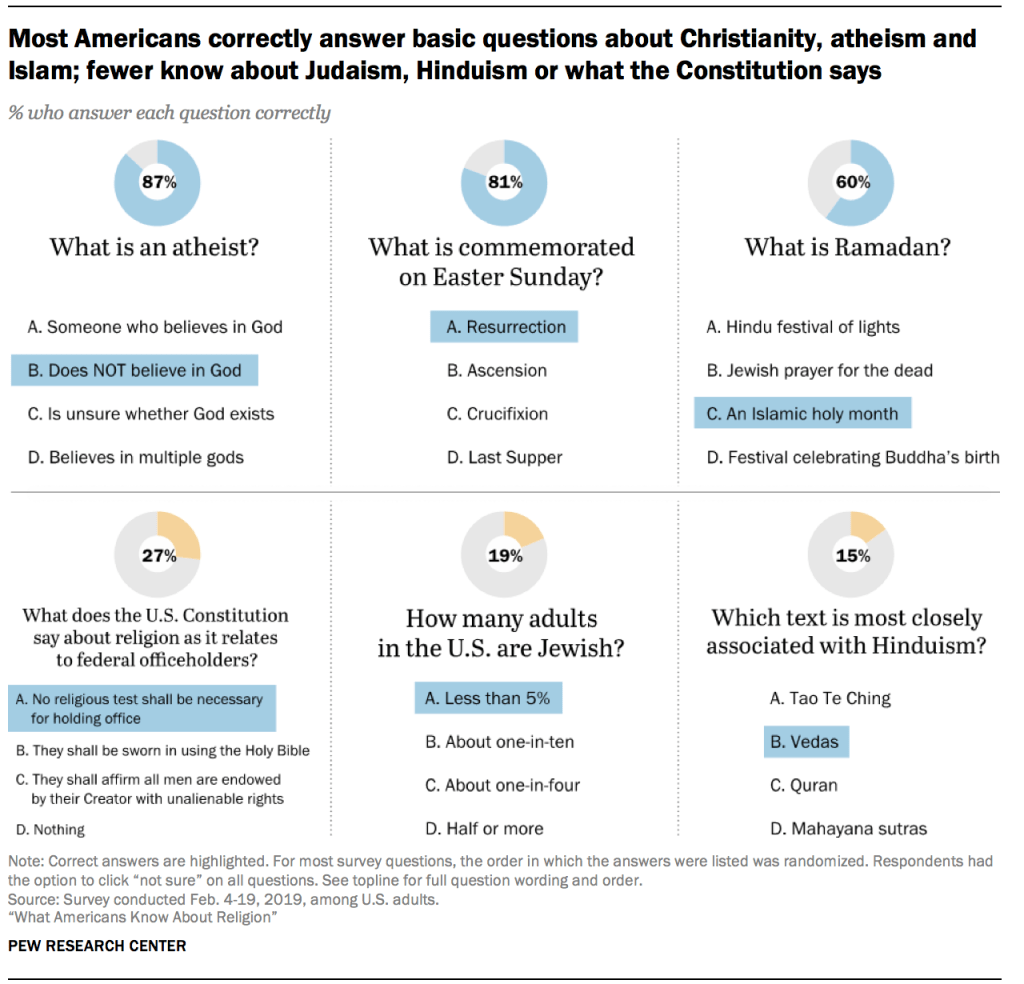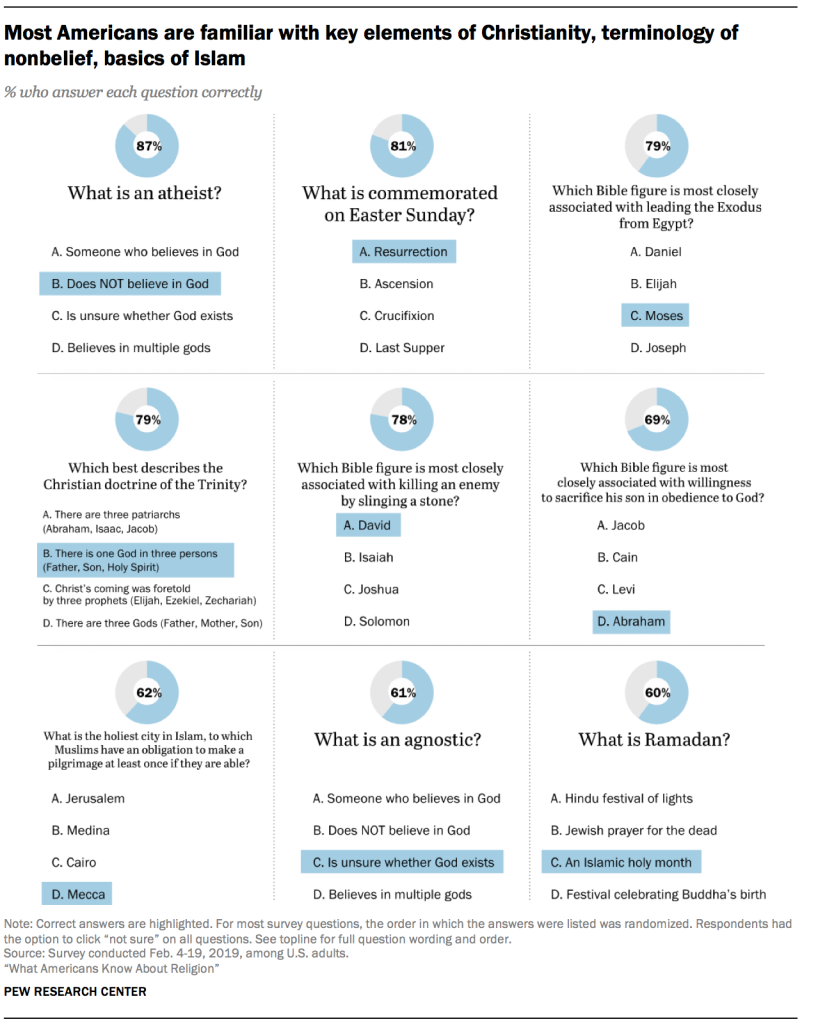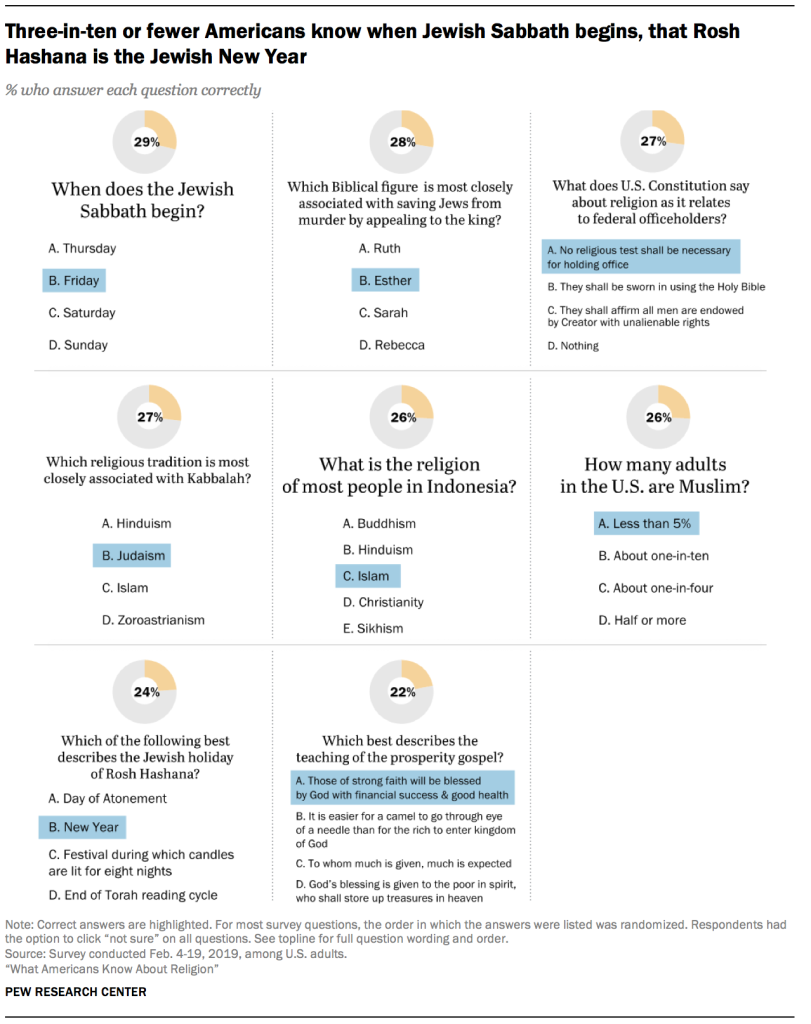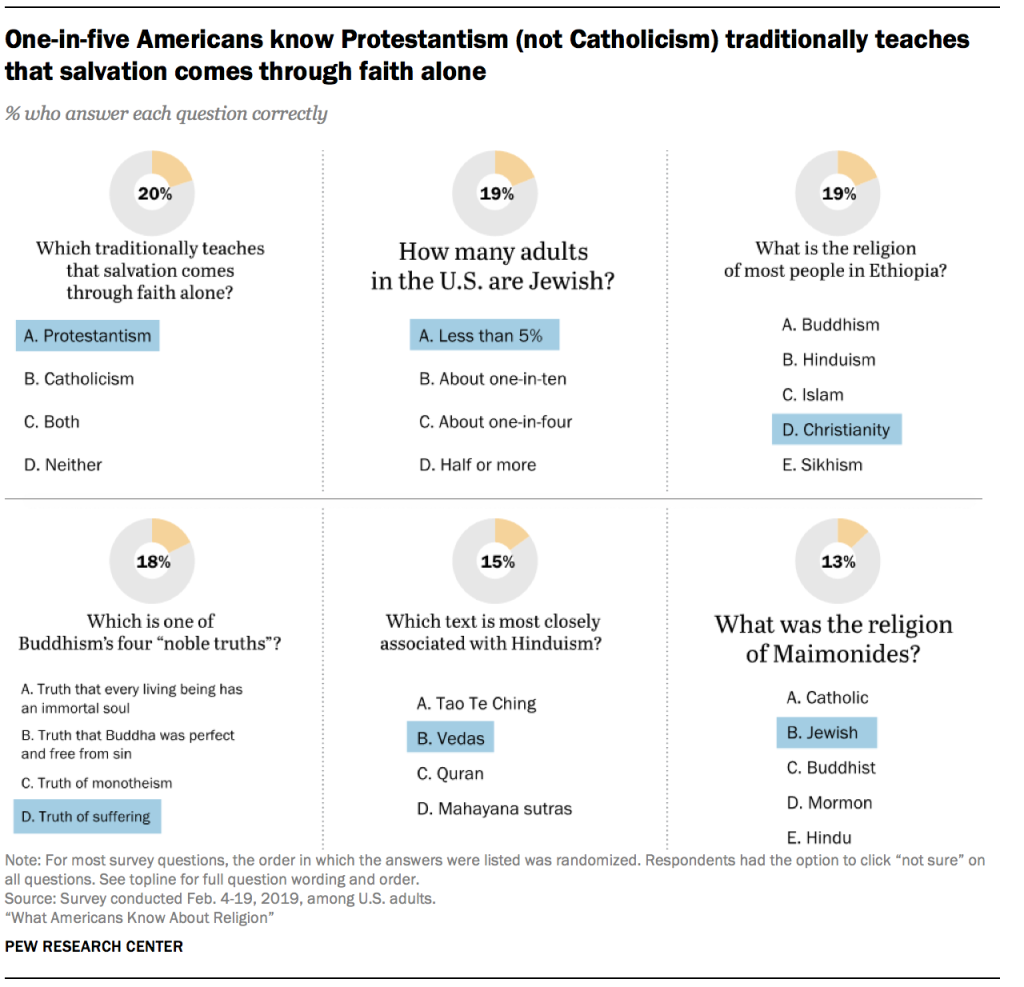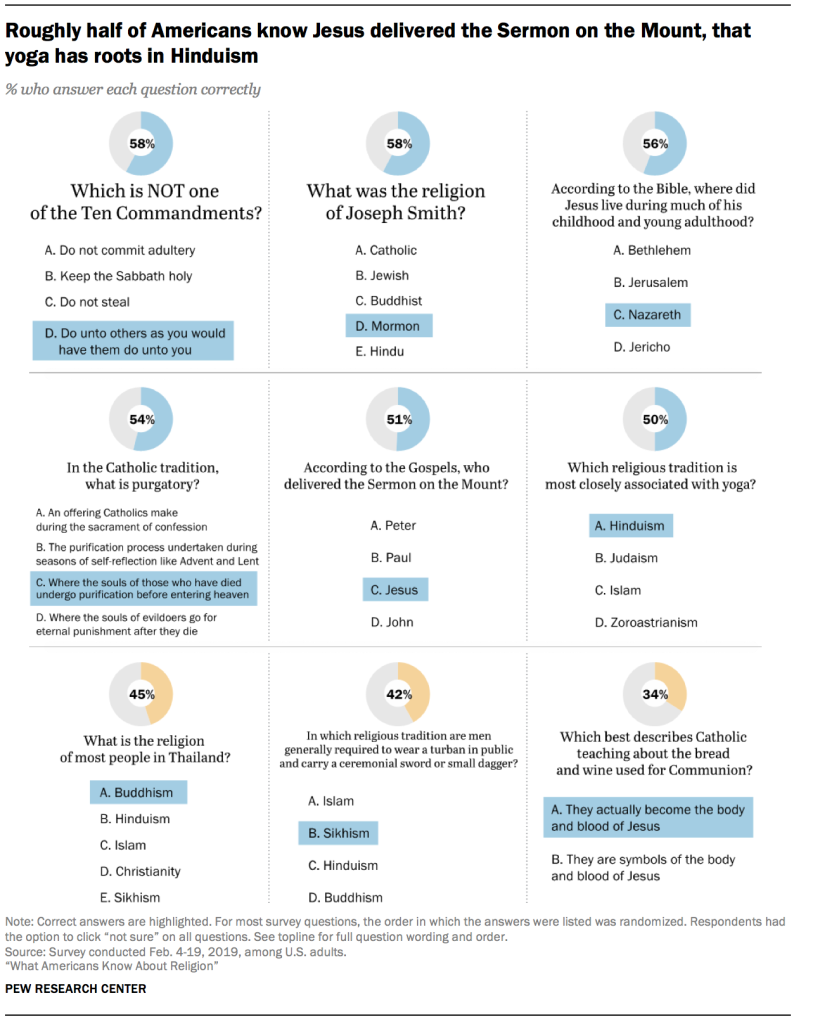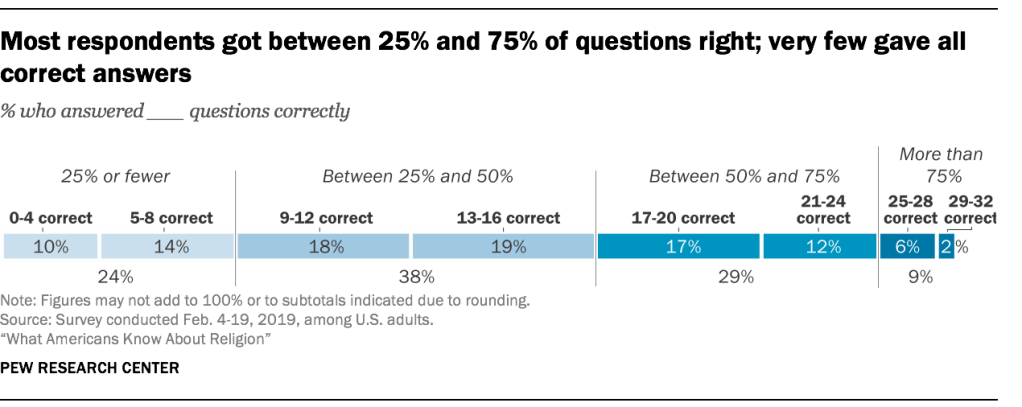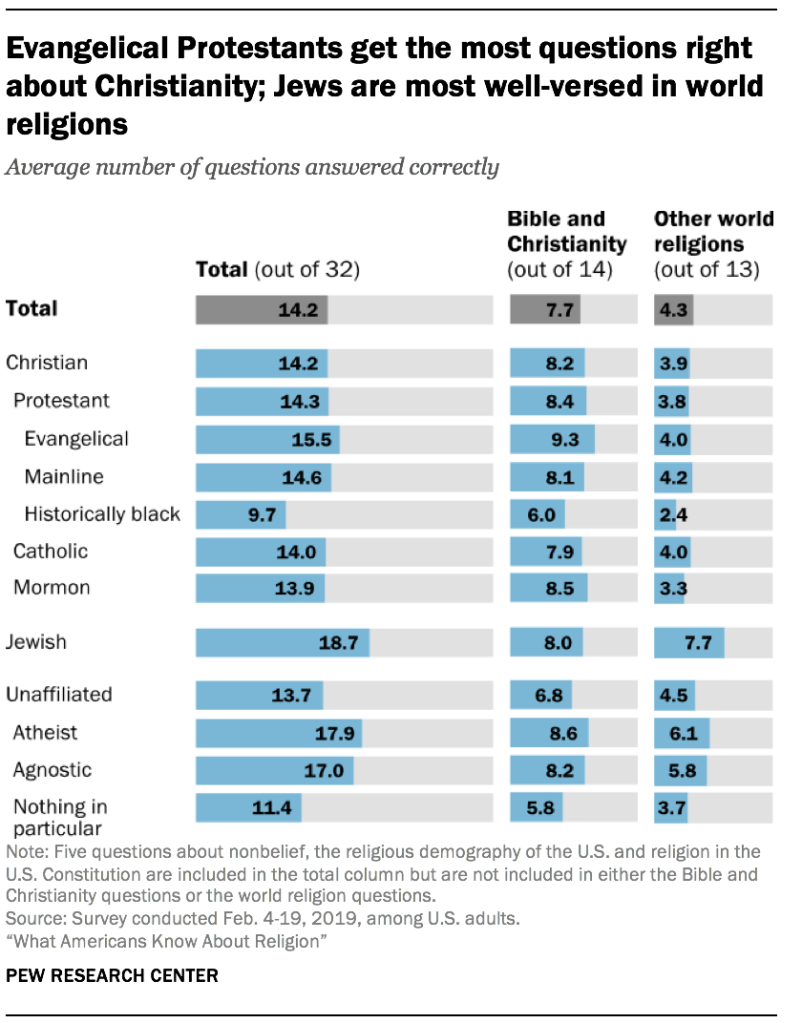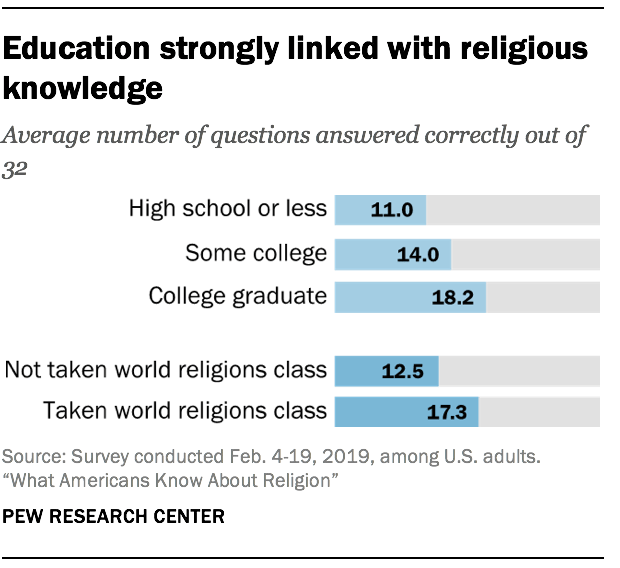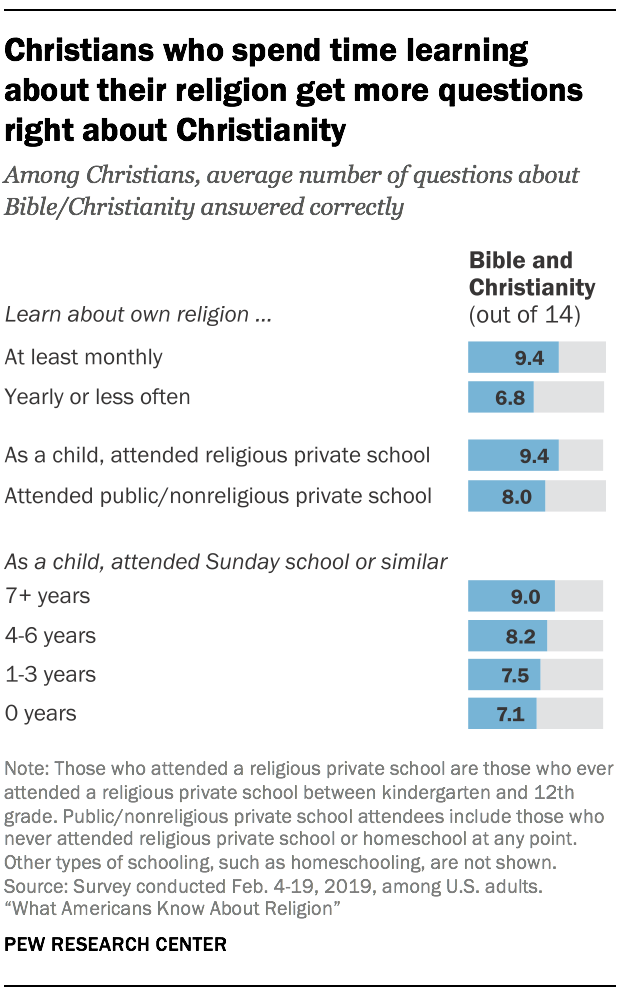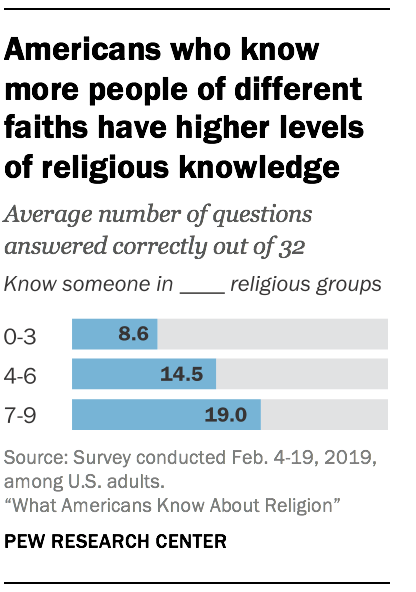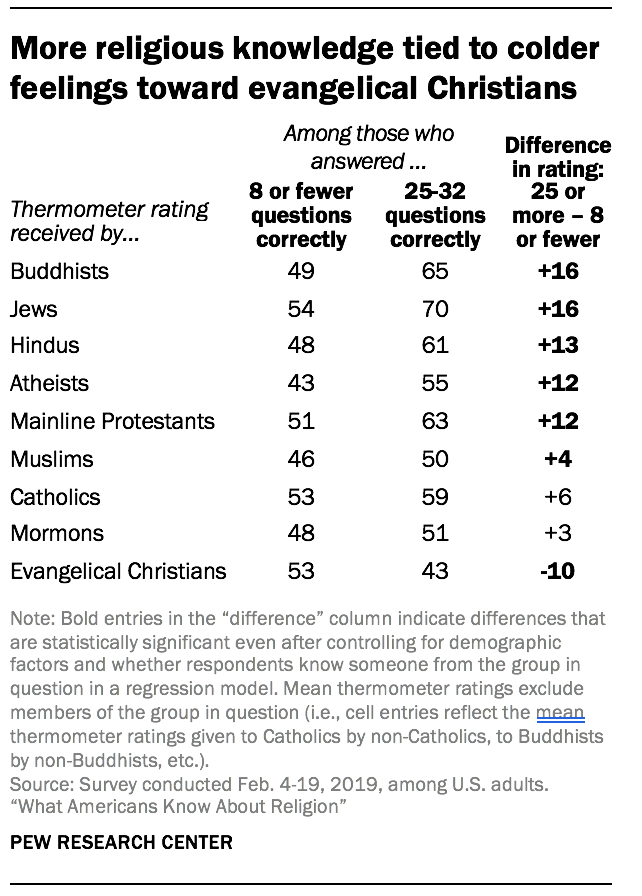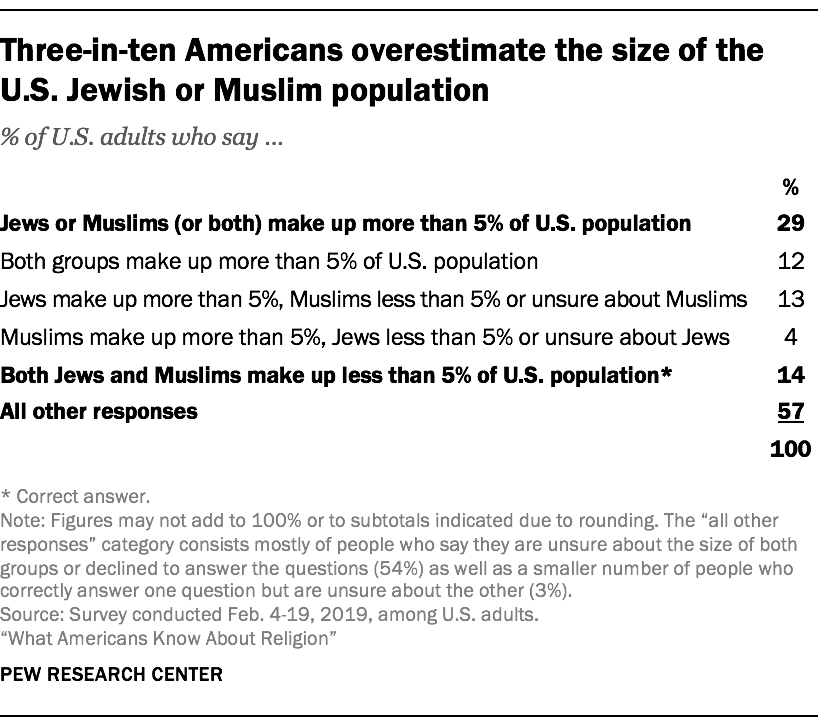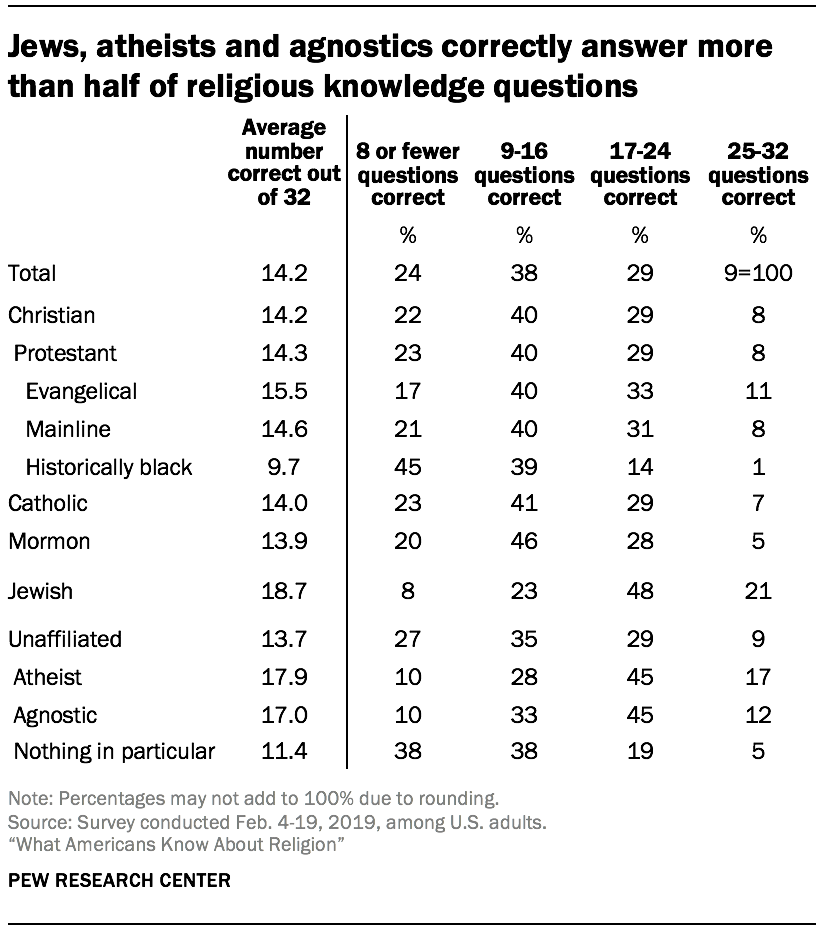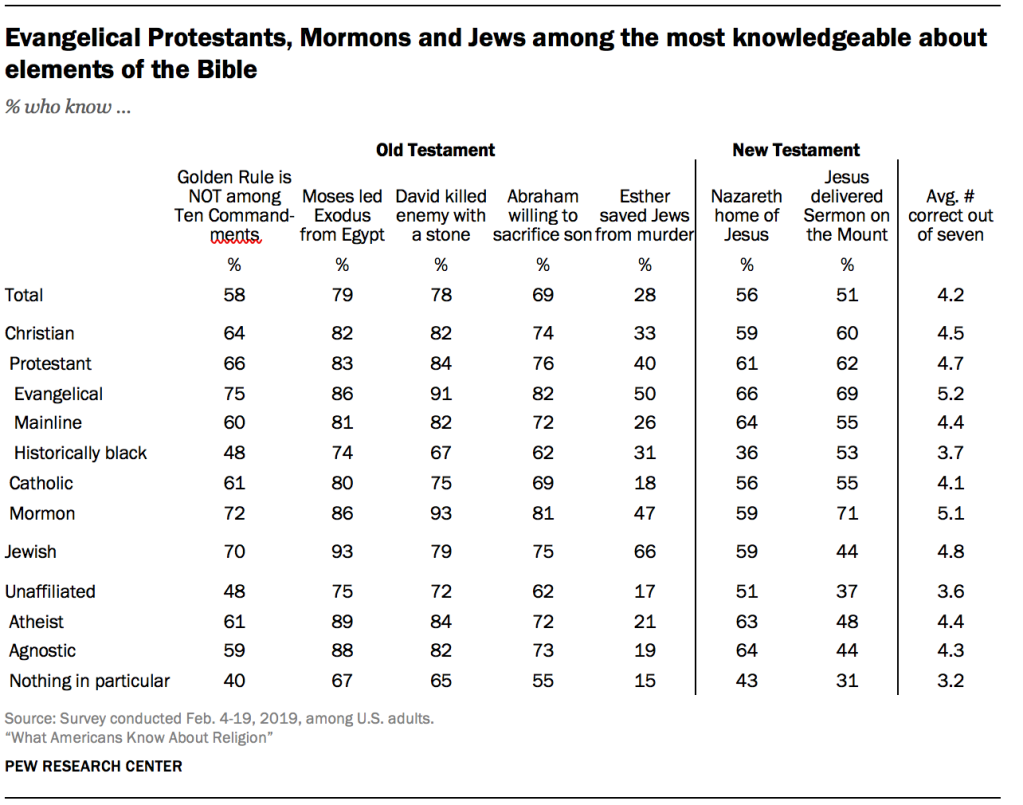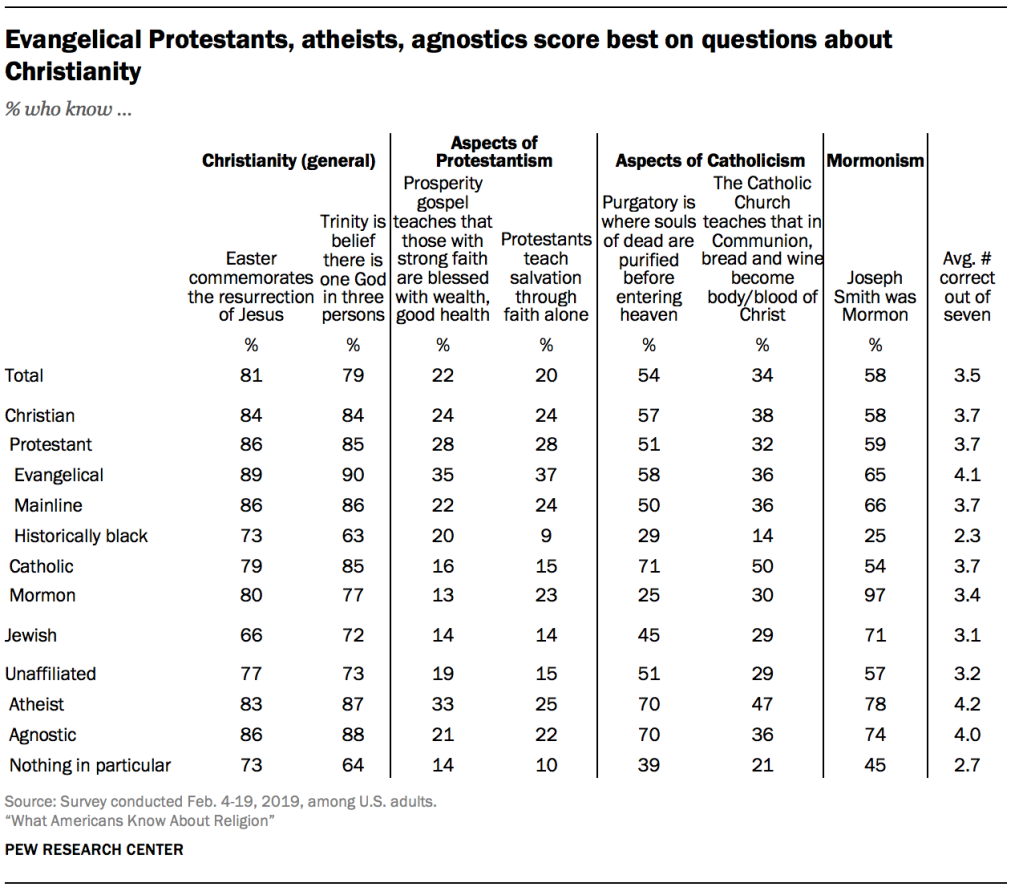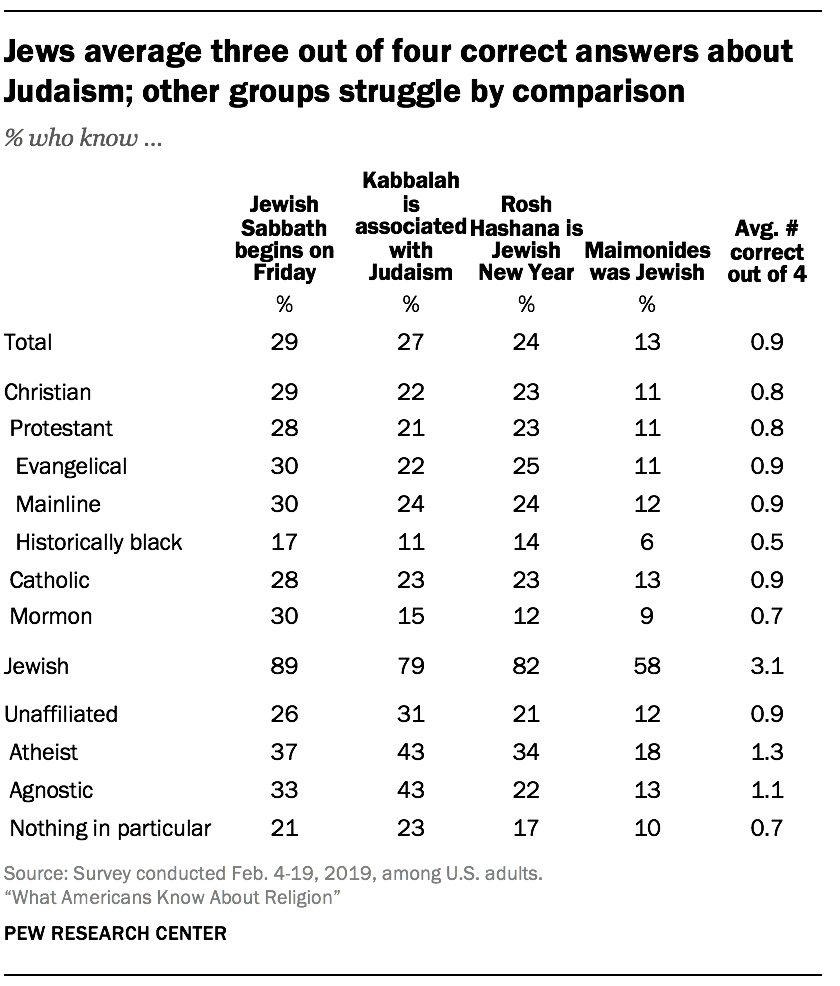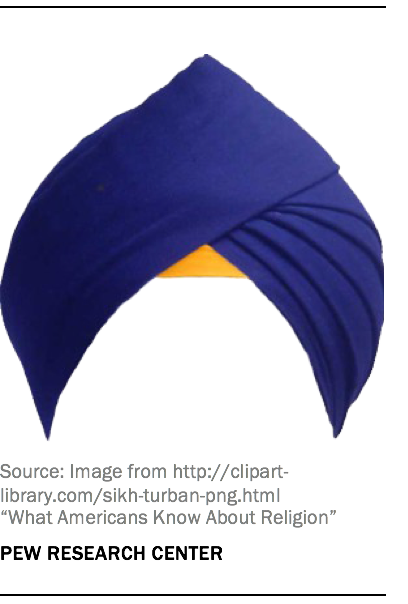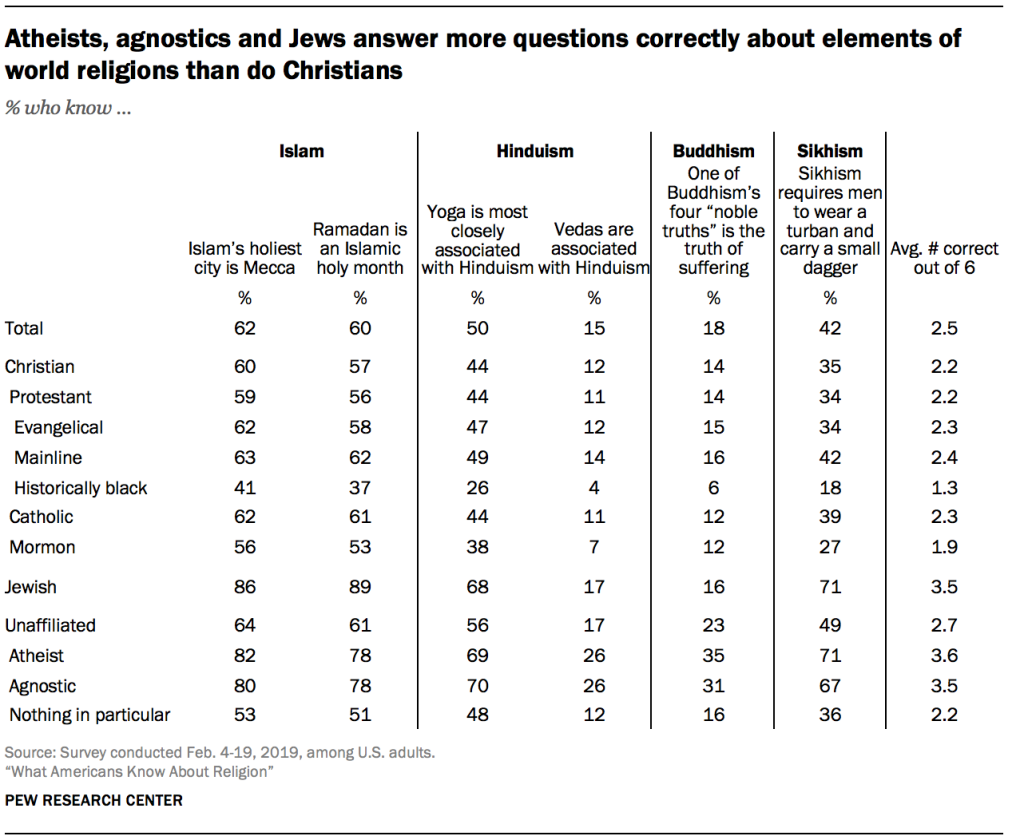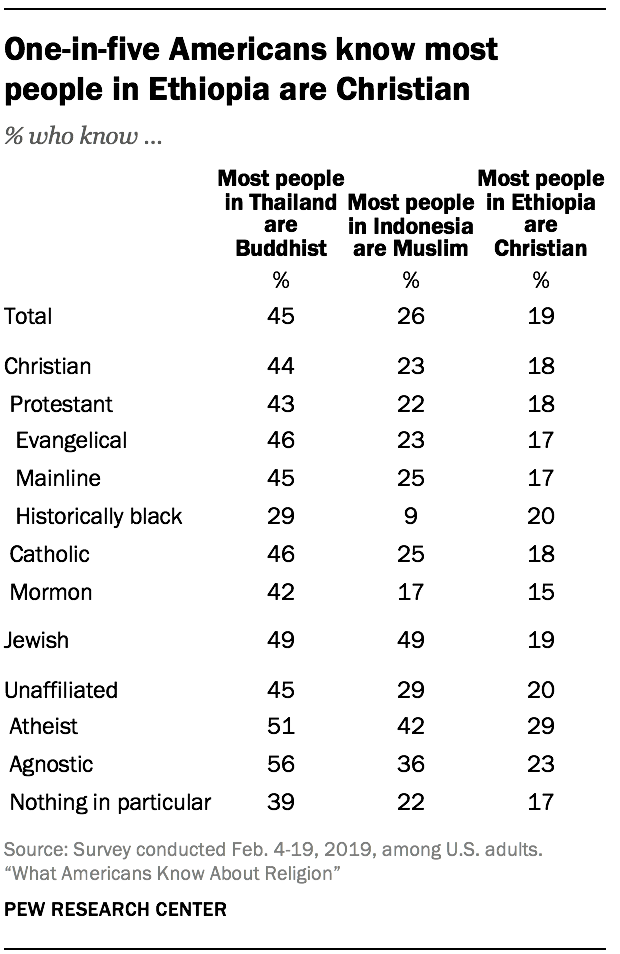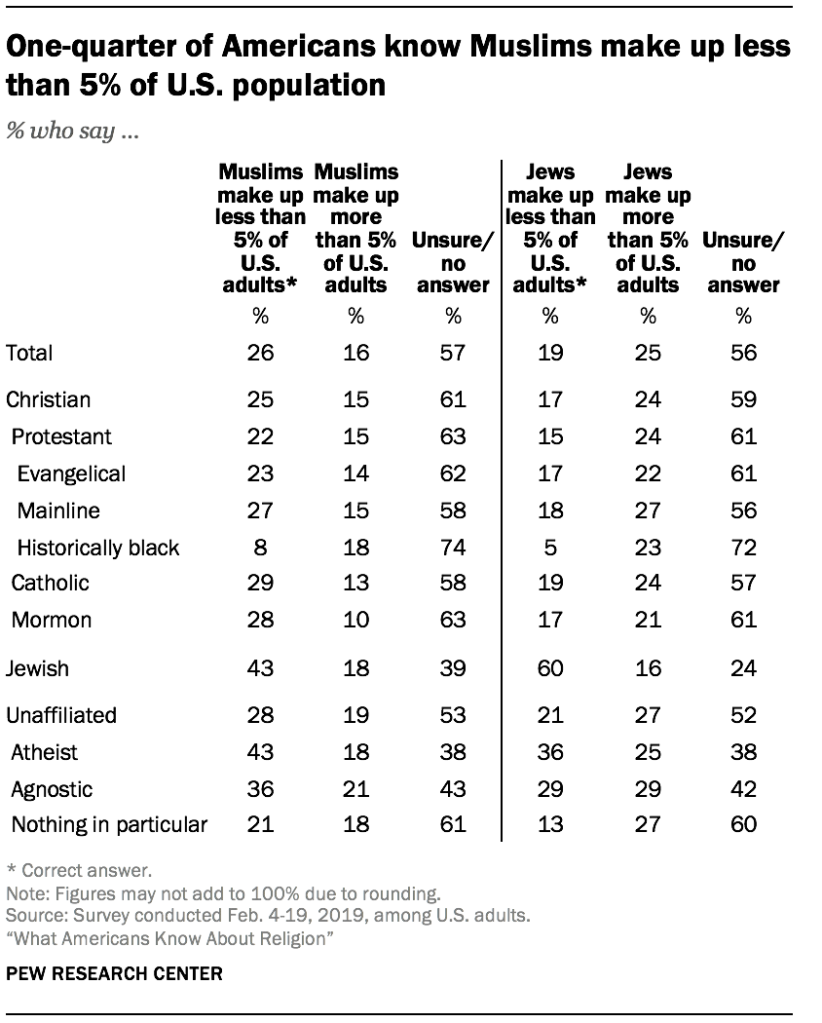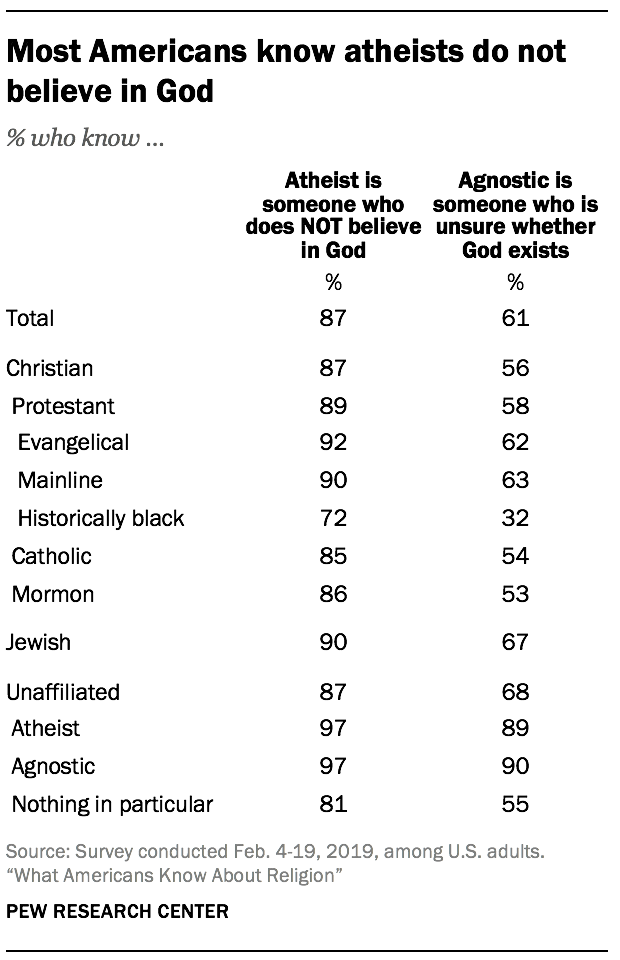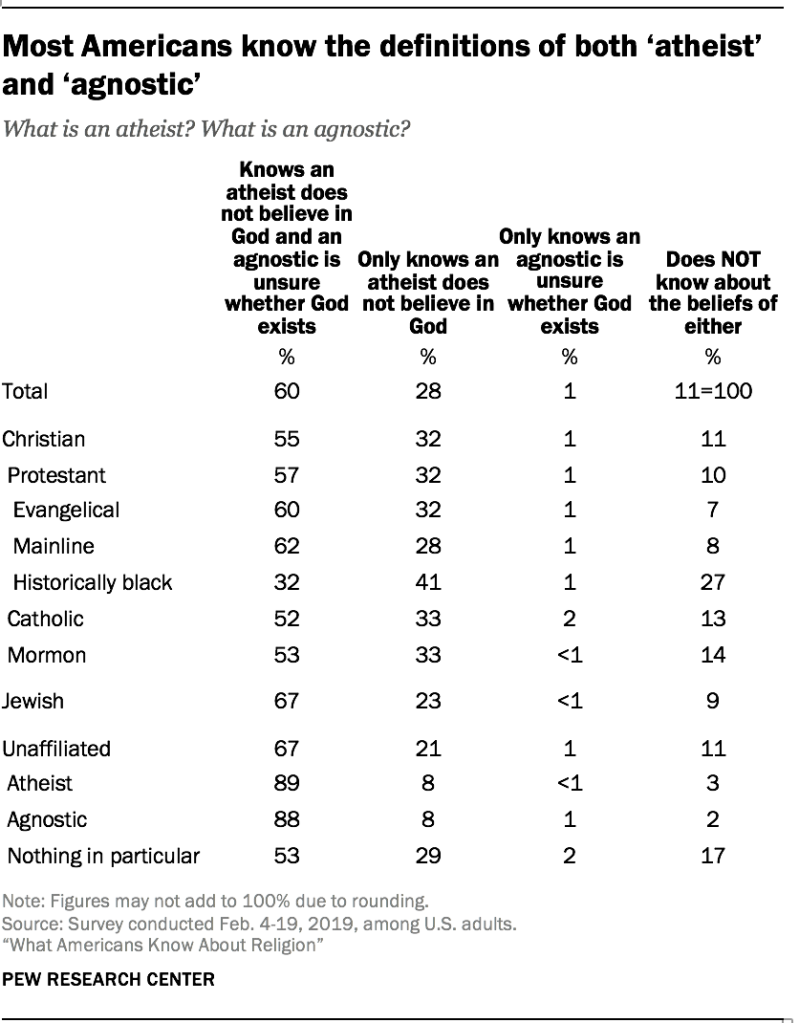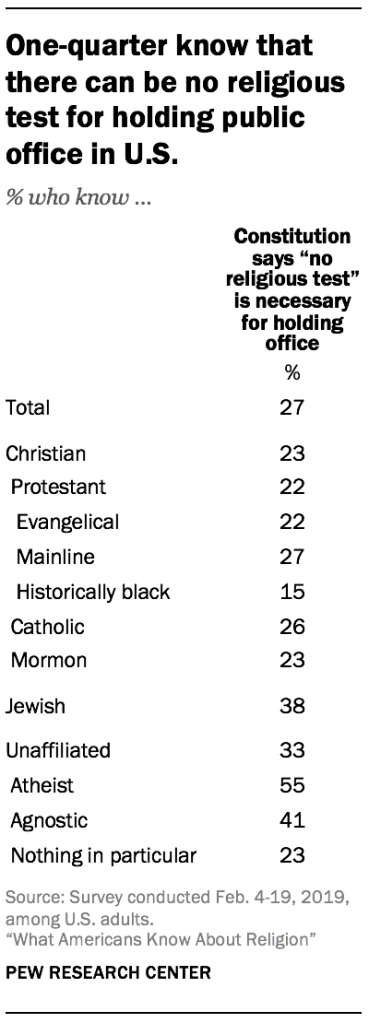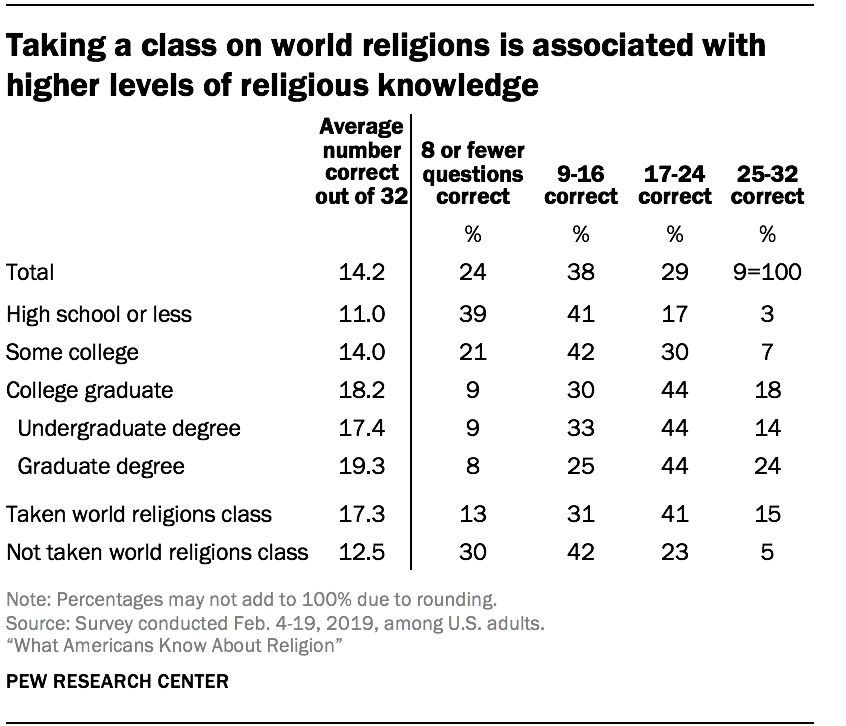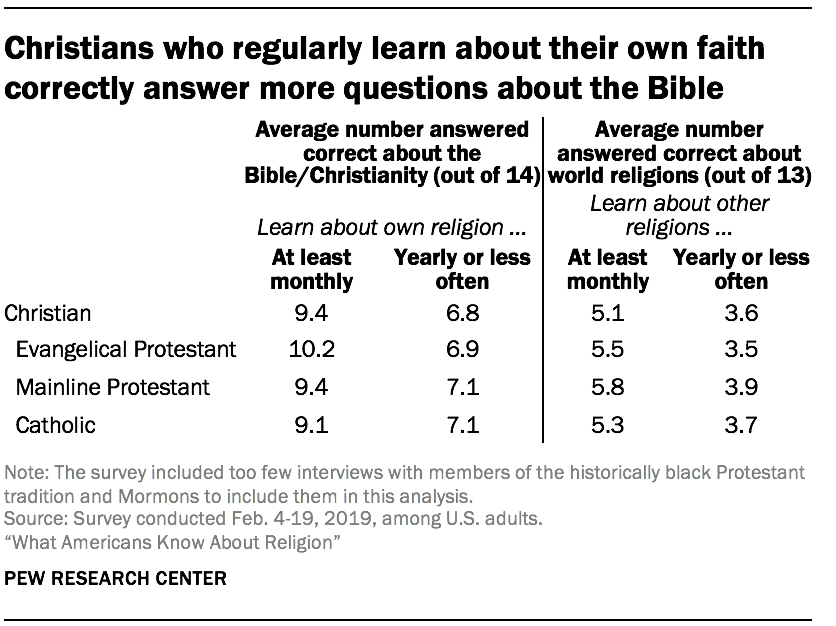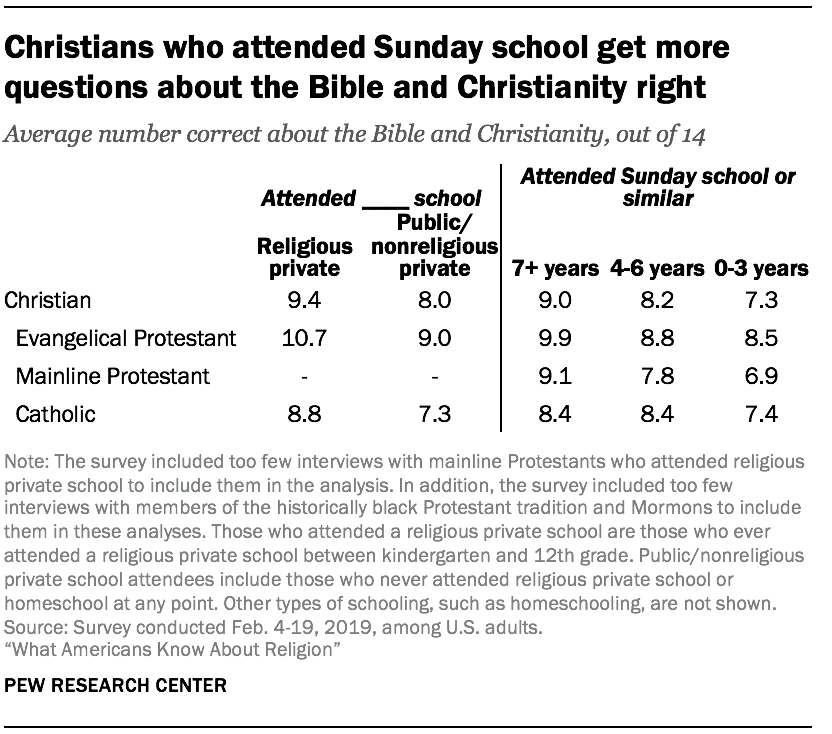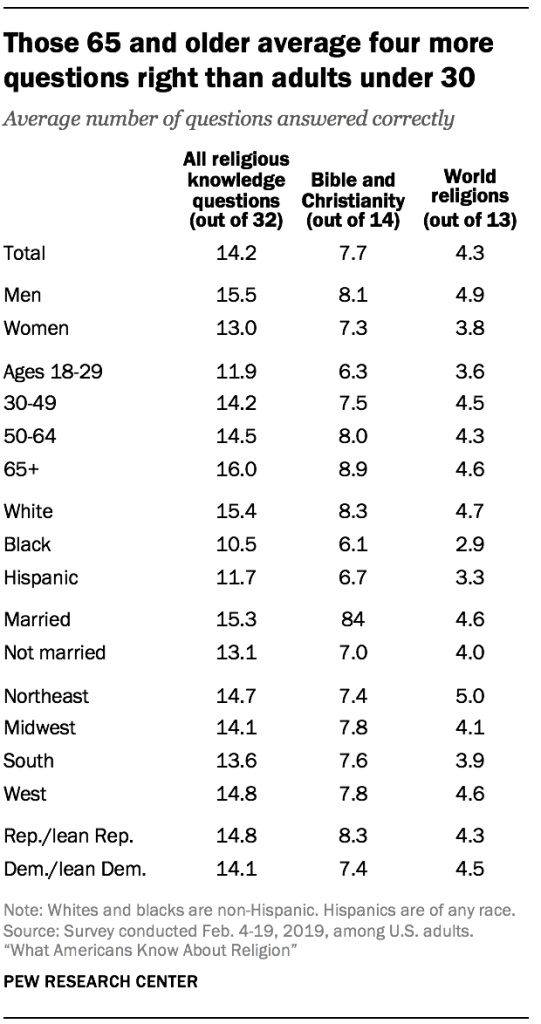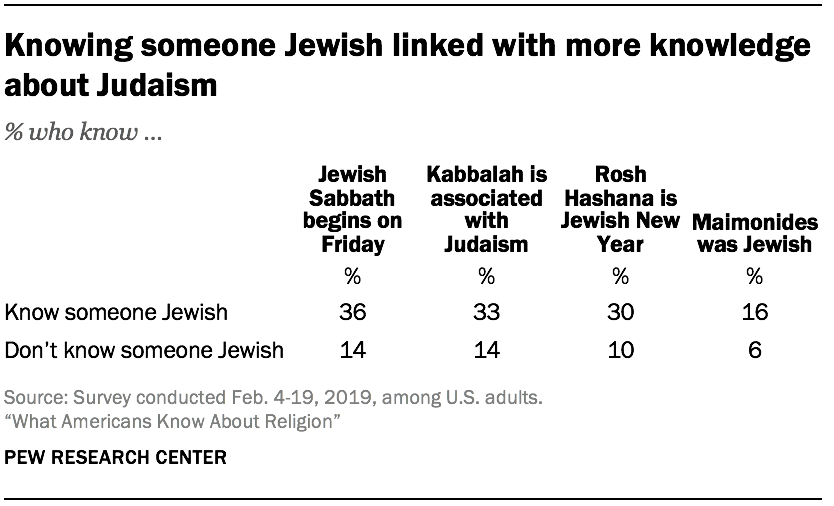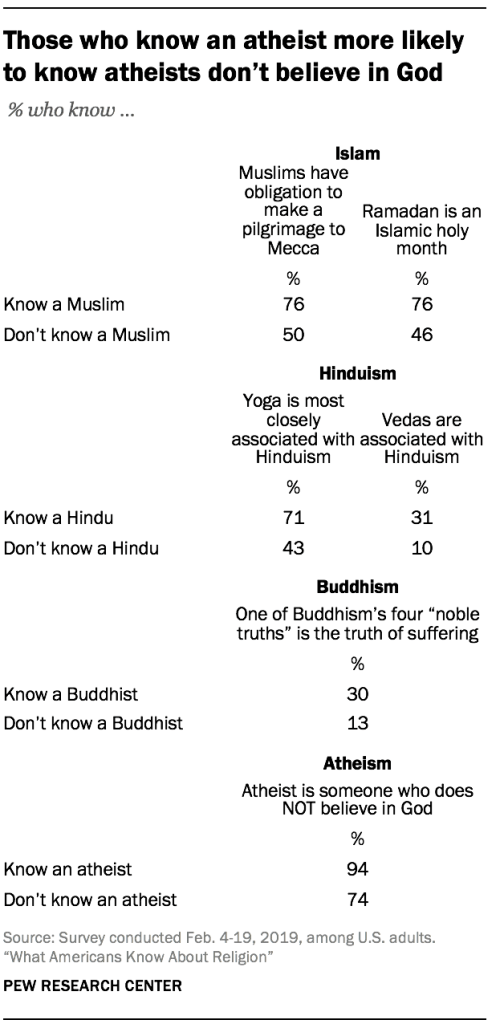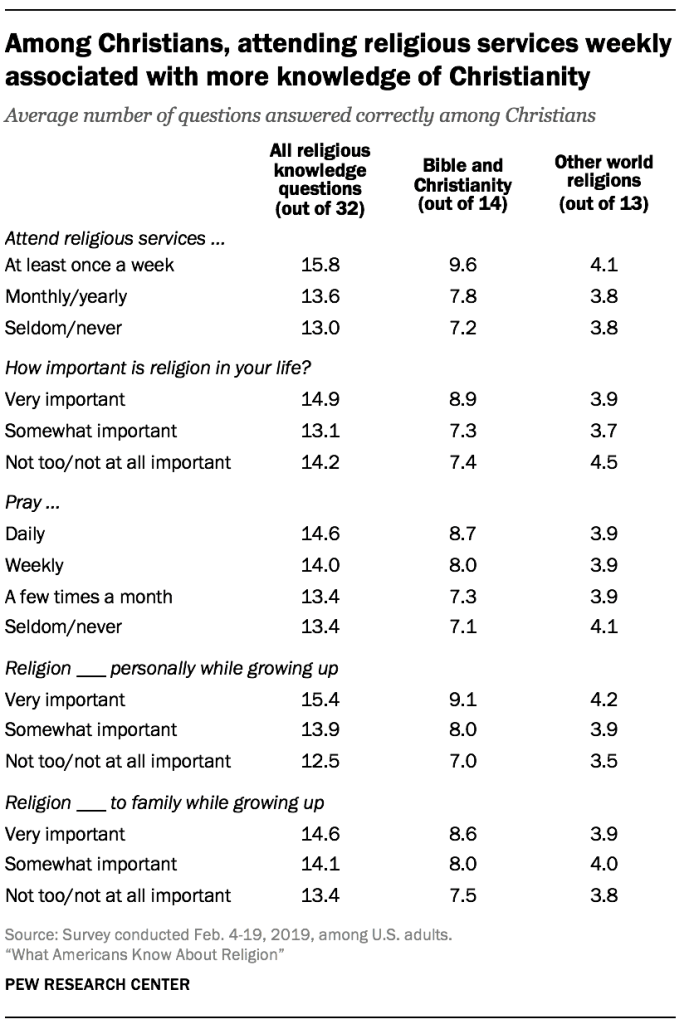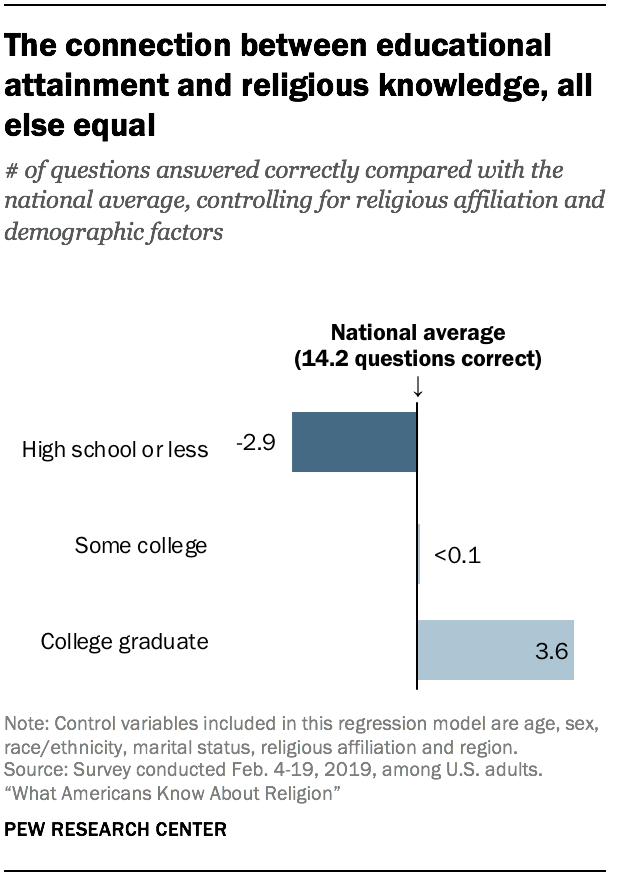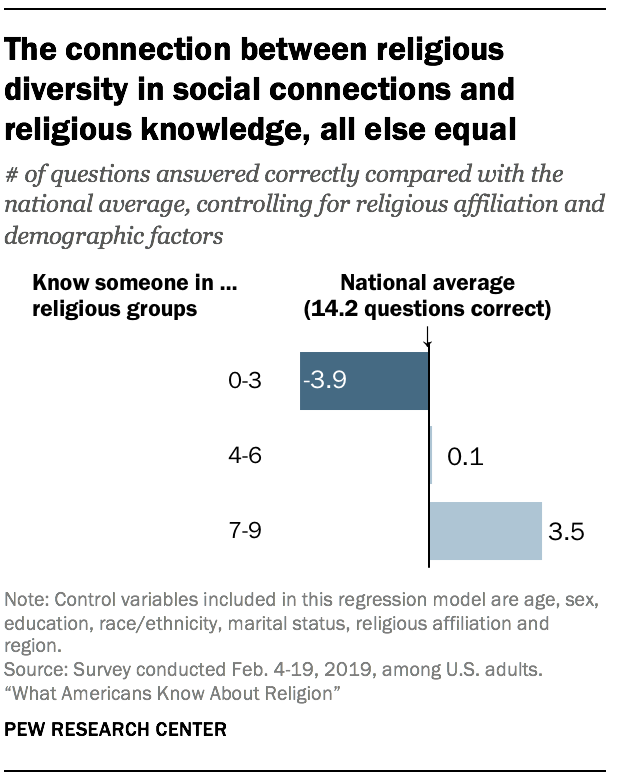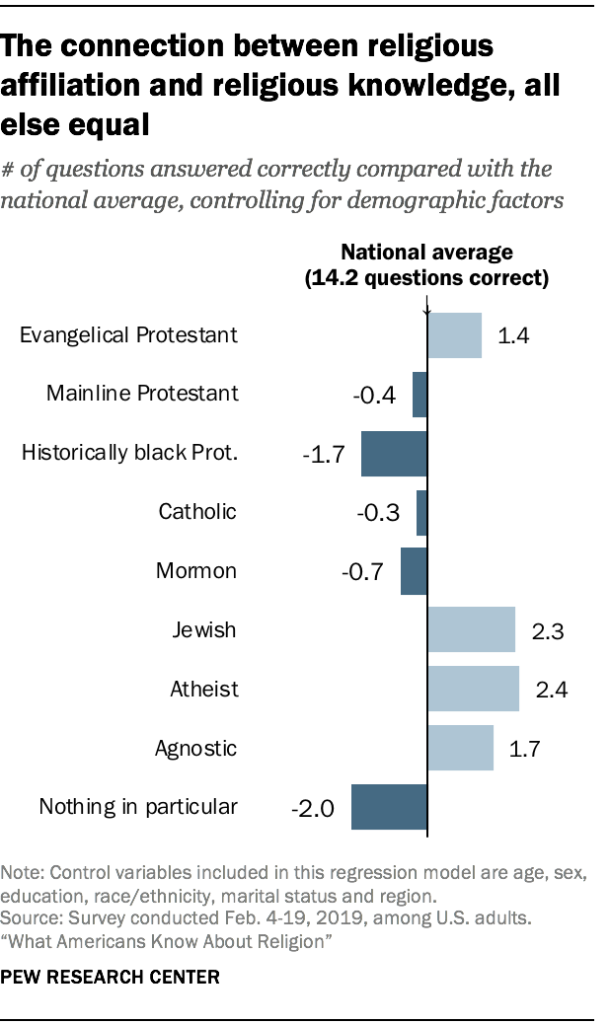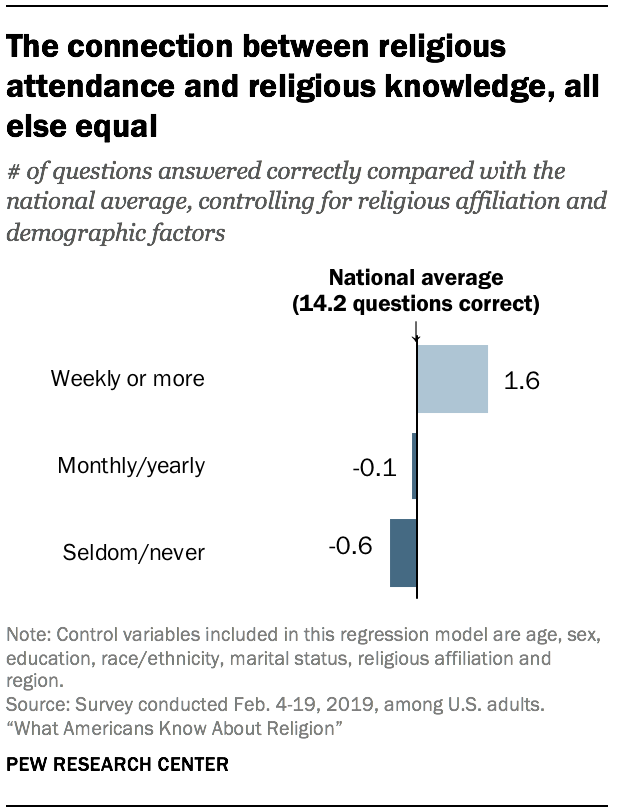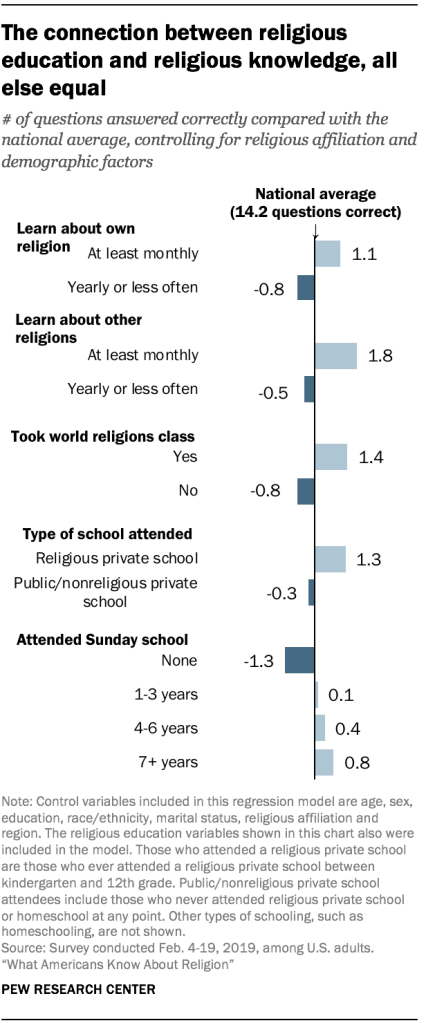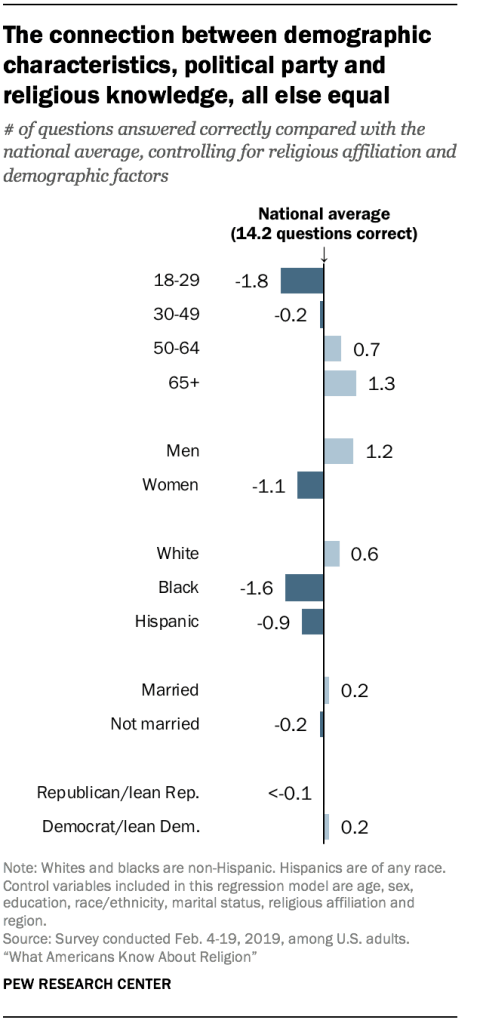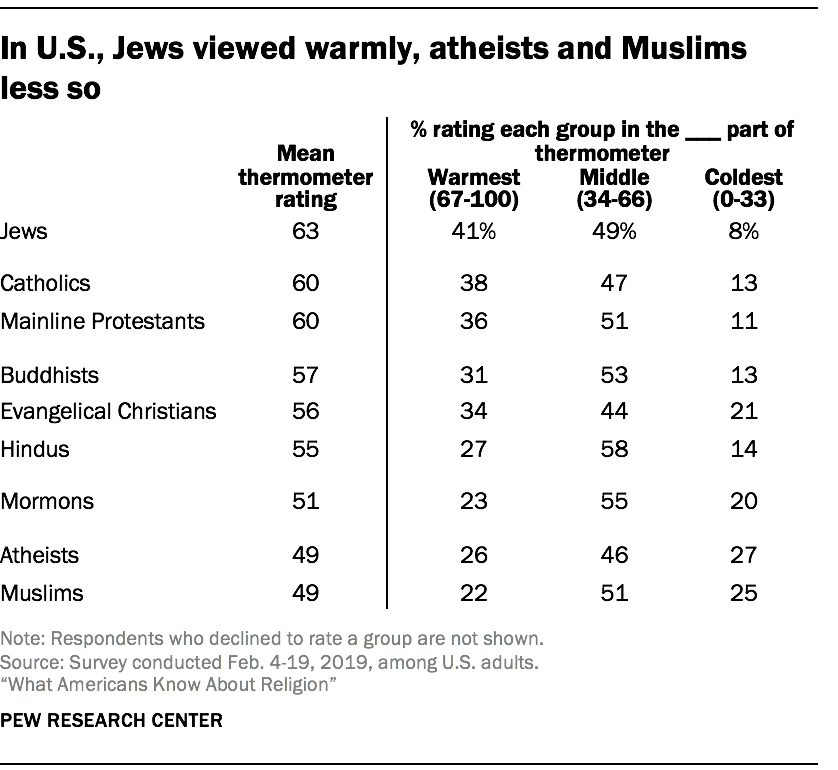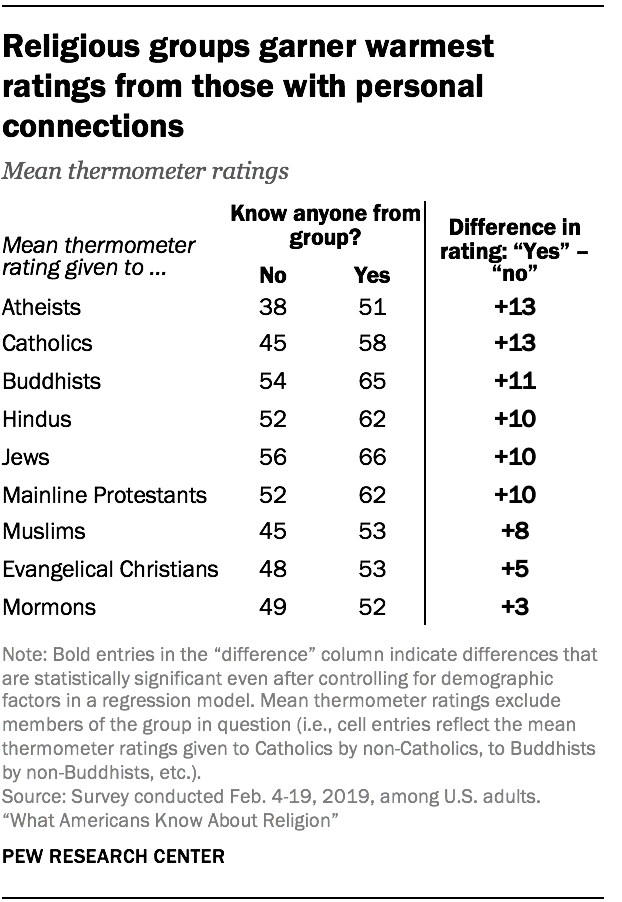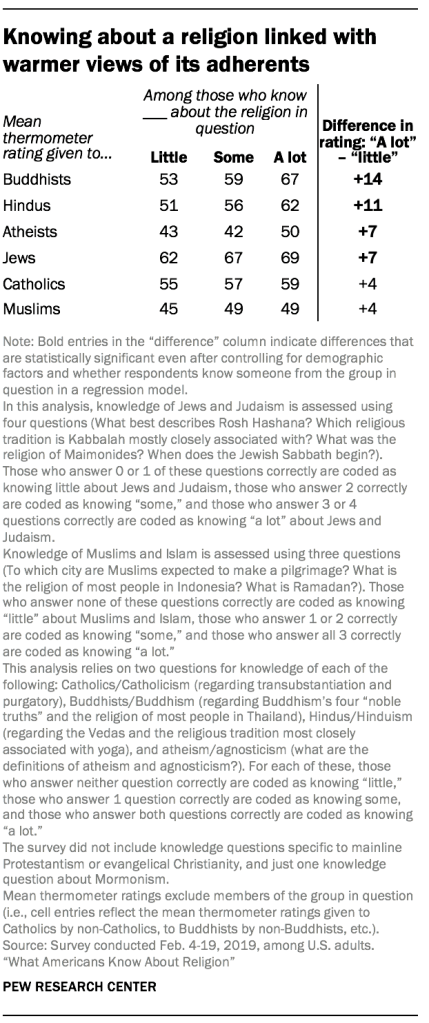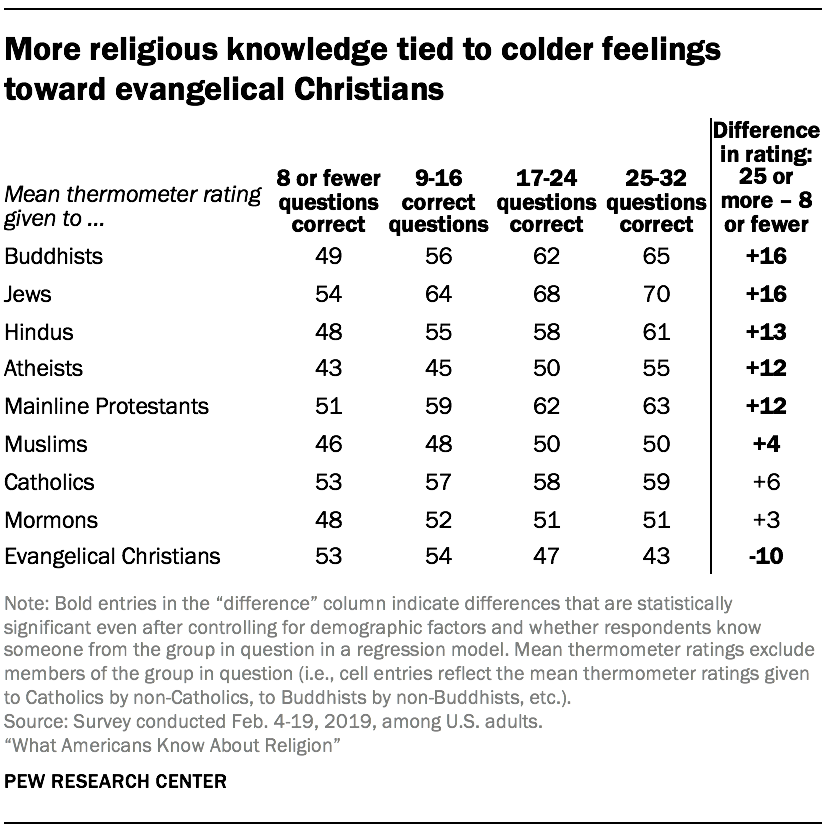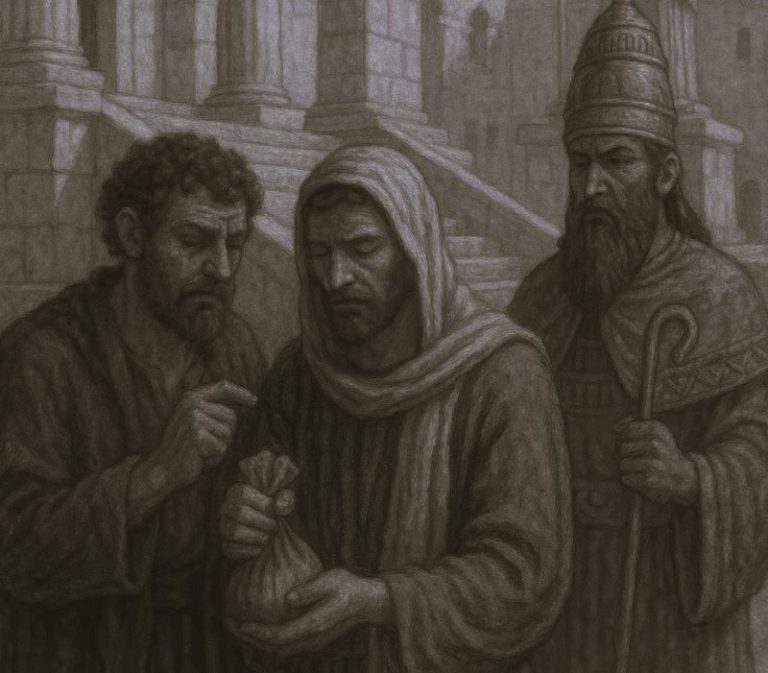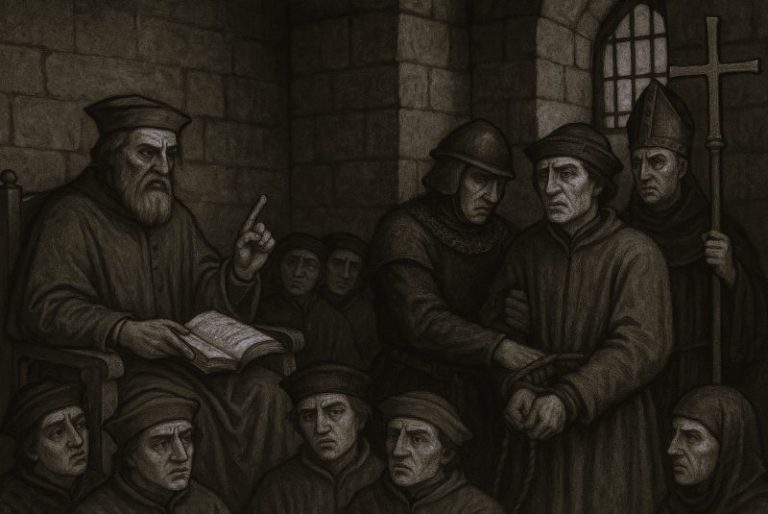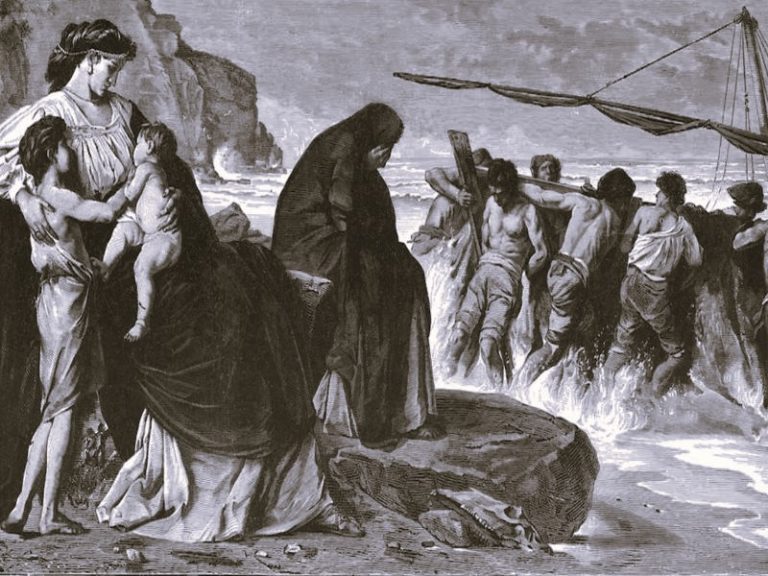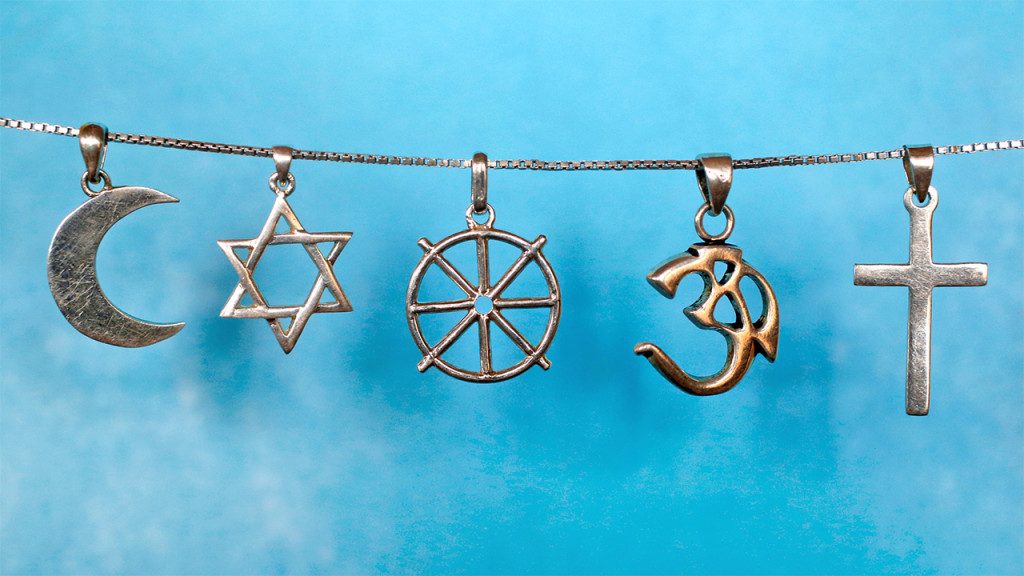
U.S. adults generally can answer basic questions about the Bible and Christianity, but are less familiar with other world religions.
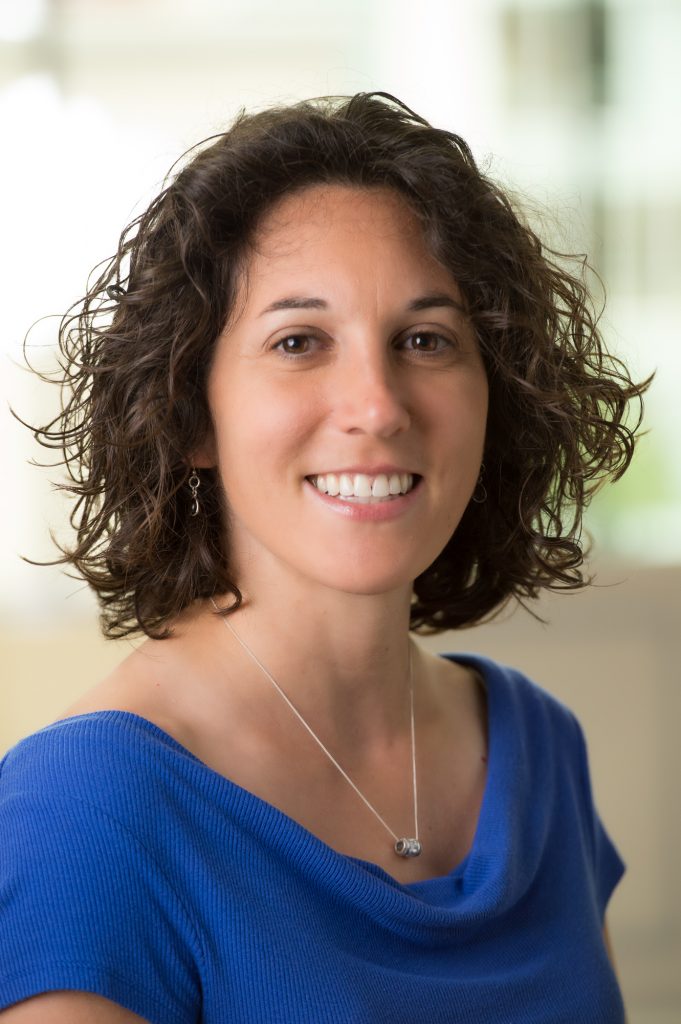
By Dr. Becka A. Alper
Research Associate
Pew Research Center

By Gregory A. Smith
Associate Director, Research
Pew Research Center
Introduction
Test your religious knowledge by taking an interactive quiz. The short quiz includes some questions recently asked in the nationally representative survey that forms the basis of this report. After completing the quiz, you can see how you did in comparison with the general public and with people like yourself.
Most Americans are familiar with some of the basics of Christianity and the Bible, and even a few facts about Islam. But far fewer U.S. adults are able to correctly answer factual questions about Judaism, Buddhism and Hinduism, and most do not know what the U.S. Constitution says about religion as it relates to elected officials. In addition, large majorities of Americans are unsure (or incorrect) about the share of the U.S. public that is Muslim or Jewish, according to a new Pew Research Center survey that quizzed nearly 11,000 U.S. adults on a variety of religious topics.
Our surveys often ask people about their opinions, but this one was different, asking 32 fact-based, multiple-choice questions about topics related to religion (see here for full list of questions). The average U.S. adult is able to answer fewer than half of them (about 14) correctly.
The questions were designed to span a spectrum of difficulty. Some were meant to be relatively easy, to establish a baseline indication of what nearly all Americans know about religion. Others were intended to be difficult, to differentiate those who are most knowledgeable about religious topics from everyone else.1
The survey finds that Americans’ levels of religious knowledge vary depending not only on what questions are being asked, but also on who is answering. Jews, atheists, agnostics and evangelical Protestants, as well as highly educated people and those who have religiously diverse social networks, show higher levels of religious knowledge, while young adults and racial and ethnic minorities tend to know somewhat less about religion than the average respondent does.
Overall, eight-in-ten U.S. adults correctly answer that in the Christian tradition, Easter commemorates the resurrection of Jesus – rather than the Crucifixion, the Ascension to heaven or the Last Supper. A similar share know that the Christian doctrine of the Trinity holds that there is one God in three persons – the Father, the Son and the Holy Spirit. Eight-in-ten Americans correctly identify Moses as the biblical figure who led the Exodus from Egypt, and David as the one who killed an enemy by slinging a stone, while seven-in-ten know that Abraham is the biblical figure who exhibited a willingness to sacrifice his son in obedience to God.
Most Americans also are familiar with two different terms that indicate a lack of belief in God. Almost nine-in-ten correctly identify the definition of “an atheist” (someone who does not believe in God), and six-in-ten correctly select the definition of “an agnostic” (someone who is unsure whether God exists).
Even some of the basics of Islam are familiar to a wide swath of the public. Six-in-ten U.S. adults know that Ramadan is an Islamic holy month (as opposed to a Hindu festival of lights, a Jewish prayer for the dead, or a celebration of the Buddha’s birth) and that Mecca (not Cairo, Medina or Jerusalem) is Islam’s holiest city and a place of pilgrimage for Muslims.
On the other hand, Americans are less familiar with some basic facts about other world religions, including Judaism, Buddhism and Hinduism.2 Just three-in-ten U.S. adults know that the Jewish Sabbath begins on Friday, one-quarter know that Rosh Hashana is the Jewish New Year, and one-in-eight can correctly identify the religion of Maimonides (an influential Jewish scholar in the Middle Ages).
Roughly one-in-five Americans (18%) know that the “truth of suffering” is among Buddhism’s four “noble truths,” and just 15% correctly identify the Vedas as a Hindu text.
Many Americans also struggle to answer some questions about the size of religious minorities in the U.S. and about religion’s role in American government. For instance, most U.S. adults overestimate the shares of Jews and Muslims in the U.S. or are unaware that Jews and Muslims each account for less than 5% of the population.3 And when asked what the U.S. Constitution says about religion as it relates to federal officeholders, just one-quarter (27%) correctly answer that it says “no religious test” shall be a qualification for holding office; 15% incorrectly believe the Constitution requires federal officeholders to affirm that all men are endowed by their Creator with certain unalienable rights, 12% think the Constitution requires elected officials to be sworn in using the Bible, 13% think the Constitution is silent on this issue, and 31% say they are not sure.
Nine of the survey’s questions were moderately difficult for respondents; more than three-in-ten but fewer than six-in-ten respondents were able to answer them correctly. These questions include one about the Ten Commandments (58% know that the golden rule is not one of the Ten Commandments), one about the Gospel account of the Sermon on the Mount (51% know it was delivered by Jesus rather than by Peter, Paul or John), and one about the Catholic teaching on transubstantiation (34% know the Catholic Church teaches that during the Mass, the bread and wine used for Communion are not symbolic, but actually become the body and blood of Jesus).
These are among the key findings of a survey conducted online Feb. 4 to 19, 2019, among 10,971 respondents. The study was conducted mostly among members of Pew Research Center’s American Trends Panel (a nationally representative panel of randomly selected U.S. adults recruited from landline and cellphone random-digit-dial surveys and an address-based survey), supplemented by interviews with members of the Ipsos KnowledgePanel.4 The margin of sampling error for the full sample is plus or minus 1.5 percentage points.
The survey was designed to measure the public’s knowledge about a wide range of religious subjects. The religious knowledge section consisted of 32 questions in total, including 14 about the Bible and Christianity, 13 about other world religions (four about Judaism, three about the religious composition of particular countries, two each about Islam and Hinduism, and one each about Buddhism and Sikhism), two about atheism and agnosticism, two about the size of religious minorities in the U.S. adult population, and one about religion in the U.S. Constitution. For a list of all the questions, see here.
The average respondent correctly answered 14.2 of the 32 religious knowledge questions. Just 9% of respondents gave correct answers to more than three-quarters (at least 25) of the questions, and less than 1% earned a perfect score.
At the other end of the spectrum, one-quarter of respondents (24%) correctly answered eight or fewer questions, and a clear majority (62%) got half (16) or fewer correct. This includes 2% of respondents who did not answer any questions correctly, mainly because they checked “not sure” in response to most or all the questions.
How Various Religious Groups Fare on the Survey
On average, Jews, atheists, agnostics and evangelical Protestants score highest on the new survey of religious knowledge, outperforming members of other Protestant traditions, Catholics, Mormons and Americans who describe their religion as “nothing in particular.”
Jews get 18.7 questions right, on average. Self-described atheists and agnostics also display relatively high levels of religious knowledge, correctly answering an average of 17.9 and 17.0 questions, respectively.
Protestants as a whole correctly answer an average of 14.3 questions, with members of the evangelical Protestant tradition (15.5) doing best within this group.5
Catholics (14.0) and Mormons (13.9) perform similarly to one another and to U.S. adults overall.
The survey does not include enough interviews with Muslim, Hindu, Buddhist or Sikh respondents to permit analysis of their levels of religious knowledge.6
Looking only at questions about the Bible and Christianity, evangelical Protestants give the highest number of right answers (9.3 out of 14, on average). Atheists and Mormons are among the next highest performers, getting an average of 8.6 and 8.5 questions right, respectively. Atheists and agnostics do about as well on questions about the Bible and Christianity as do Christians overall.
Jews are the top performers on questions about other world religions, getting 7.7 questions right, on average, out of 13 questions about Judaism, Islam, Buddhism, Hinduism, Sikhism and global religious demography.7 Atheists (6.1) and agnostics (5.8) also do well on these questions compared with the national average (4.3).
Other Factors Associated with Religious Knowledge
Beyond religious affiliation, what other factors are linked with how much religious knowledge a person has? The survey indicates that educational attainment – how much schooling an individual has completed – is strongly associated with religious knowledge. College graduates correctly answer 7.2 more questions, on average, than people with a high school education or less schooling.
One possible explanation for why Jews, atheists and agnostics score among the highest on this survey is that all three of these groups are highly educated, on average. However, Jews, atheists and agnostics display greater religious knowledge than other groups even after controlling for education and other demographic characteristics associated with knowing more about religion.
Another educational factor linked with religious knowledge is having taken a class on world religions. Those who say they have taken a world religions class (e.g., in high school or college) answer 17.3 questions correctly, on average, compared with 12.5 among those who have not taken such a class.
Among Christians, knowledge of the Bible and Christianity is closely linked both with the amount of effort respondents say they invest in learning about their faith and with their religious background. Christians who say they regularly spend time learning about their own religion (for example, reading scripture, visiting websites, listening to podcasts, reading books or magazines, or watching television) answer more questions correctly about the Bible and Christianity than do those who say they make such efforts to learn about their faith less often (9.4 questions right out of 14 total, vs. 6.8).
The survey also finds that Christians who attended a religious private school while growing up answer 9.4 questions about the Bible and Christianity correctly, on average. By comparison, Christians who attended a public school or a nonreligious private school get fewer of those questions right.8 Similarly, Christians who spent many years attending Sunday school or a similar type of religious education (for example, CCD for Catholics) correctly answer more questions about the Bible and Christianity than do Christians who never attended Sunday school.
The survey did not include enough interviews with Jews, Muslims, Buddhists, Hindus or members of other religions to permit reliable analysis of the connection between their religious education and knowledge of their respective religions.
In addition to educational factors, the religious diversity of Americans’ social networks also appears to have a connection with levels of religious knowledge.
The survey included a set of questions asking respondents whether they personally know someone who is an evangelical Christian, a Catholic, a Mormon, a Jew, a Muslim, an atheist, a Buddhist, a Hindu or a mainline Protestant. Respondents who know someone who belongs to a religious group tend to correctly answer more questions about that religion. For example, those who personally know someone who is Muslim are far more likely than those who do not know anyone who is Muslim to identify Ramadan as an Islamic holy month (76% vs 46%). And while 71% of respondents who know someone who is Hindu also know that yoga has its roots in the religion, just 43% of those who do not know a Hindu are aware of yoga’s Hindu roots.
Overall, Americans with the most religiously diverse social networks earn the highest scores on the religious knowledge survey. On average, respondents who know someone from at least seven different religious groups answer 19.0 questions right, on average, while those who know someone from three or fewer religious groups average 8.6 right.
Religious Knowledge Linked with More Favorable Views of Religious Groups
The survey also asked respondents to rate nine different religious groups on a “feeling thermometer” ranging from 0 (coldest and most negative) to 100 (warmest and most positive). Overall, Americans give Jews an average rating of 63 degrees. Catholics and mainline Protestants each receive an average rating of 60 degrees, followed closely by Buddhists (57 degrees), evangelical Christians (56 degrees) and Hindus (55 degrees). The average ratings given to Mormons, atheists and Muslims hover near the 50-degree mark.9
Those who are most knowledgeable about a religion (and are not members of that religion) tend to rate the religion’s adherents most favorably. For instance, Buddhists receive an average thermometer rating of 67 degrees from non-Buddhists who correctly answer both of the survey’s Buddhism-knowledge questions correctly, but just 53 degrees from those who answer neither Buddhism-knowledge question correctly. The average rating given to Hindus is 11 degrees warmer among those who know a lot about Hinduism than among those who know little about Hinduism.
Moreover, higher scores on the overall (32-point) religious knowledge scale tend to be associated with warmer evaluations of most religious groups. Jews, for instance, receive an average thermometer rating of 70 degrees from non-Jews who answer 25 or more religious knowledge questions correctly, compared with just 54 degrees from those who answer eight or fewer questions correctly. One exception to this pattern is evangelical Christians, who are rated most warmly by those at the low end of the religious knowledge scale.
Other findings from the survey include:
- Half of Catholics in the United States (50%) correctly answer a question about official church teachings on transubstantiation – that during Communion, the bread and wine actually become the body and blood of Christ. The other half of Catholics incorrectly say the church teaches that the bread and wine used in Communion are just symbols of the body and blood of Christ (45%) or say they are not sure (4%).
- Christians who attend religious services at least once a week correctly answer nearly 10 of the survey’s 14 questions about the Bible and Christianity, on average (9.6). By contrast, Christians who say they seldom or never attend religious services correctly answer an average of 7.2 of these questions.
- Just one-in-five Americans (20%) know that Protestantism traditionally teaches that salvation comes through faith alone, a key theological issue in the Protestant Reformation.10 One-in-ten incorrectly believe that Catholicism teaches that salvation comes through faith alone, while the remainder of adults declined to offer a response in the survey (38%) or wrongly state that both Protestantism and Catholicism teach this (23%) or that neither Christian tradition teaches this (8%). Evangelical Protestants are more likely than other groups to know the traditional Protestant teaching, though even among evangelicals, far fewer than half (37%) answer the question correctly.
- When asked to choose the best description of the “prosperity gospel” from a list of options, roughly one-in-five adults (22%) correctly identify it as the idea that those of strong faith will be blessed by God with financial success and good health. Half of Americans (49%) say they are not sure what the prosperity gospel is. About one-in-eight (12%) incorrectly believe that the prosperity gospel is the teaching that it is easier for a camel to go through the eye of a needle than for a rich person to enter the kingdom of God. An additional 8% think it is the belief that God’s blessing is given to the poor in spirit who shall store up treasures in heaven, and 7% say the prosperity gospel reflects the notion that “to whom much is given, much is expected.”
- Three-in-ten U.S. adults (29%) overestimate the size of the U.S. Jewish or Muslim populations, incorrectly stating that one or both of these groups make up more than 5% of the U.S. population. This includes 12% who think the size of both groups exceeds 5%, 13% who think Jews account for more than 5% of U.S. adults, and 4% who believe the Muslim population is larger than it is. Just 14% of respondents know that the Jewish and Muslim communities in the U.S. each make up less than 5% of the overall U.S. population.11 And slightly more than half of U.S. adults (54%) say they are unsure about the size of both the Jewish and Muslim populations.
- Questions about different religions not only vary in difficulty, but also focus on specific aspects of religions and do not cover the breadth of knowledge people may have about any specific religion. As a result, the survey cannot definitively state that Americans are more knowledgeable about Islam than they are about other non-Christian religions. Still, respondents were more likely to correctly answer the questions about Islam in this particular survey than they were to choose the correct answers about Judaism, Hinduism, Buddhism and Sikhism. Indeed, roughly six-in-ten Americans know that Ramadan is an Islamic holy month and that Mecca is Islam’s holiest city, roughly double the share of U.S. adults who know when the Jewish Sabbath starts or what the Jewish holiday of Rosh Hashana celebrates.
- Men get more questions right, on average, than women (15.5 vs. 13.0).12 And Americans who are 65 or older correctly answer about 16 questions, on average, while those under 30 get fewer right (11.9). 13 Non-Hispanic white respondents score higher (15.4 questions right, on average) on the survey’s religious knowledge questions than black respondents (10.5) and Hispanic respondents (11.7). These gender, age, and racial and ethnic differences are statistically significant even after controlling for education, religious affiliation and the religious diversity of respondents’ social networks.
This is the second time Pew Research Center has tested how much U.S. adults know about religion. The first survey, conducted in 2010, found that atheists, agnostics, Jews and Mormons were the top performers, while in the new survey, atheists, Jews, agnostics and evangelical Protestants scored highest. However, there are several important differences between the two surveys that make them not directly comparable. To begin with, many of the questions asked in the new survey were not asked in 2010. Just 12 of the 32 current knowledge questions appeared on the 2010 survey, and all the repeated questions have been modified in ways that make direct comparisons impossible.
Another difference is that the 2010 survey was conducted on the phone by live interviewers, while the current survey was conducted online with respondents entering their own answers. Sometimes when the same question is asked in two different modes, such as over the phone and online, there is a difference in results attributable to what survey methodologists call a mode effect. In other words, the presence of a live interviewer may encourage people to answer questions differently than they would if no one was observing their (self-recorded) responses.
Also, the 2019 survey included a “not sure” response to every religious knowledge question; respondents were given the explicit option of clicking “not sure” and skipping to the next question whenever they were unsure of an answer. By contrast, in the 2010 survey, respondents did not have an explicit “not sure” response option read to them over the phone. Instead, respondents were able to say they “don’t know” only if they volunteered it as a response.14 As a result of all these differences, the results cannot speak to whether Americans have become more or less knowledgeable about religion over the past decade.
Moreover, there is no objective way to determine how much the U.S. public should know about religion, or what are the most important things to know. As with the 2010 survey, the questions in the 2019 survey are intended to be representative of a body of general knowledge about religion; they are not meant to be a list of the most essential facts.
Which Religious Groups Know About What Religion?
Overview
Based on religious affiliation (or lack thereof), the groups that display the highest levels of religious knowledge on this survey include Jews (who get an average of 18.7 out of 32 questions correct), self-described atheists (17.9) and self-described agnostics (17.0). Looked at another way, seven-in-ten Jewish respondents (69%) answer at least half of the questions correctly, and 21% correctly answer at least 25 of the 32. More than six-in-ten atheists (62%) answer more than half of the survey’s religious knowledge questions correctly, including 17% who get more than three-quarters right.
Evangelical Protestants also answer an above-average number of questions correctly (15.5, compared with 14.2 among all respondents). Mainline Protestants, Catholics and Mormons closely resemble the general public in their overall levels of religious knowledge, getting between 13.9 and 14.6 questions correct on average.
These overall patterns in scores among religious groups hold true even after controlling for levels of education and other key demographic characteristics such as race, age and gender.15
The remainder of this chapter analyzes religious knowledge among different religious groups within key subject areas including the Bible, Christianity, elements of Judaism, knowledge of other world religions, atheism and agnosticism, and religion in public life.
Knowledge of the Bible
Overall, Americans correctly answer an average of 4.2 out of the survey’s seven questions about the Bible, including five about the Old Testament and two about the New Testament. Evangelical Protestants and Mormons are among the top performers on the biblical knowledge questions, correctly answering an average of 5.2 and 5.1 questions, respectively. Jews also do relatively well, correctly answering 4.8 questions, on average. By comparison, those who say their religion is “nothing in particular” correctly answer fewer than half the questions about the Bible (3.2). Members of other religious groups fall in between.
Of the four Old Testament figures who featured in the questions, Americans are most familiar with Moses and David. Roughly eight-in-ten U.S. adults (79%) know that Moses (not Daniel, Elijah or Joseph) was the biblical figure who led the Exodus from Egypt. A similar share (78%) correctly identify David (as opposed to Isaiah, Joshua or Solomon) as the biblical figure who killed an enemy by slinging a stone. Seven-in-ten Americans (69%), meanwhile, know that Abraham was the biblical figure willing to sacrifice his son out of obedience to God.
Compared with Moses, David and Abraham, Esther is less well-known. Just 28% of U.S. adults correctly identify her as the woman who saved the Jews from murder by appealing to King Ahasuerus. Two-thirds of Jews get this question right, far exceeding the performance of every other religious group on this question. Jews read the Book of Esther (also called the Megillah) and commemorate her feat during the annual holiday of Purim.
The fifth question about the Old Testament quizzed Americans about the Ten Commandments, asking which of four options is NOT among the 10. Nearly six-in-ten Americans (58%) correctly answer that the Golden Rule – “Do unto others as you would have them do unto you” – is not one of the Ten Commandments. Far fewer say, incorrectly, that “keep the Sabbath holy” (29%), “do not steal” (3%) or “do not commit adultery” (1%) do not appear in the Ten Commandments.
When it comes to the New Testament, 56% of U.S. adults know that according to the Bible, Jesus lived in Nazareth (not Bethlehem, Jerusalem or Jericho) during his childhood and young adulthood. And half of the public knows that the Sermon on the Mount was given by Jesus (not Peter, Paul or John).
Knowledge of Christianity
In addition to the questions about the Bible, the survey contained seven items about elements of Christianity. On average, U.S. adults correctly answer half (3.5) of these questions. Evangelical Protestants get 4.1 of the seven right, on average, on par with atheists (4.2) and agnostics (4.1). Catholics (3.7 questions right, on average) and mainline Protestants (3.7) are next, followed by Mormons (3.4) and Jews (3.1).
The survey’s most widely known facts about Christianity involve Easter and the Trinity. Eight-in-ten Americans (81%) know that Easter commemorates Jesus’ resurrection, and not his crucifixion, ascension to heaven, or last supper. A similar share (79%) know that the doctrine of the Trinity holds that there is one God in three persons (the Father, the Son, and the Holy Spirit). Just 3% of those surveyed choose one of the wrong answers to the question about the Trinity, while nearly one-in-five (17%) say they are unsure what the Trinity is.
At the other end of the spectrum, many Americans struggle with the survey’s questions asking specifically about Protestantism. Just one-fifth of respondents correctly identify Protestantism as the source of the Christian teaching that salvation comes through faith alone (a teaching known since the Reformation by the Latin term sola fide). Others erroneously think sola fide is taught by the Catholic Church or that it is taught in both Protestantism and Catholicism (or neither).
And fewer than one-quarter of Americans (22%) know that the prosperity gospel teaches that those of strong faith will be blessed with financial success and good health. Even among Protestants, fewer than a third answer these questions correctly (28% on each), although evangelical Protestants do better than other Protestants on both.
Slightly more than half of Americans (54%) are familiar with the Catholic concept of purgatory, where the souls of those who have died undergo purification before they enter heaven, but nearly one-quarter of respondents (23%) erroneously think purgatory refers to a place of eternal punishment for the souls of evildoers. A smaller share of U.S. adults (34%) know that the Catholic Church teaches that during the Mass, the bread and wine used for Communion actually become the body and blood of Christ (a process called transubstantiation); most (55%) say that these are just symbols, according to the church. Catholics are more likely than those in most other groups to get these questions right (71% of Catholics know what purgatory is, and 50% know the church’s teaching on transubstantiation), but even among Catholics, there is a substantial degree of confusion on these topics.
The survey also asked people to identify the religion of Joseph Smith, the founder of Mormonism. A majority of Americans (58%) know Smith’s religion, including virtually all U.S. Mormons (97%).
Knowledge of Judaism
The survey included four questions about elements of Judaism. Jews answer most of these questions correctly, getting 3.1 out of the four questions right. Members of other religions answer fewer right, ranging from 0.5 questions correct, on average (among members of the historically black Protestant tradition), to 1.3 questions (among atheists).
Overall, roughly three-in-ten Americans (29%) know that the Jewish Sabbath begins on Friday (not Thursday, Saturday or Sunday).16 One-quarter (27%) know that Kabbalah is associated with Judaism (not Hinduism, Islam or Zoroastrianism), and 24% know that the holiday of Rosh Hashana marks the Jewish New Year (not the Day of Atonement, a festival in which candles are lit for eight nights, or the celebration of the end of the Torah reading cycle).
Just 13% of U.S. adults know that Maimonides was Jewish (not Catholic, Buddhist, Mormon or Hindu), making that one of the most difficult questions in the survey. Jews answer this question correctly at much higher rates than the public overall, with 58% getting it right. But even among Jews, 6% select an incorrect answer to the question and 36% say they are unsure.
Knowledge of Islam, Hinduism, Buddhism and Sikhism
The survey included six questions about world religions other than Christianity and Judaism (two about Islam, two about Hinduism, one about Buddhism and one about Sikhism), and Americans answer an average of 2.5 of these questions correctly. Atheists (3.6), agnostics (3.5) and Jews (3.5) do the best on this set of questions. (The survey did not include enough interviews with Muslim, Hindu, Buddhist or Sikh respondents to permit analysis of their levels of religious knowledge.)
About six-in-ten Americans (62%) know that Mecca (not Cairo, Jerusalem or Medina) is Islam’s holiest city, to which Muslims have a religious obligation to make a pilgrimage at least once during their lifetime, if they are able to do so. And a similar share of the public (60%) knows that Ramadan is an Islamic holy month (and not a Hindu festival of lights, a Jewish prayer for the dead, or a festival celebrating Buddha’s birth).
Half of the public correctly identifies yoga as most closely associated with Hinduism (not Judaism, Islam or Zoroastrianism). But when asked to choose which text is most closely associated with Hinduism – the Tao Te Ching, Vedas, Quran or Mahayana Sutras – just 15% of Americans correctly select the Vedas.
Roughly one-in-five members of the public know that one of Buddhism’s four “noble truths” is the “truth of suffering” (18%); 22% incorrectly cite the idea that every living being has an immortal soul, while 5% say – wrongly – that one of Buddhism’s “noble truths” is that the Buddha was perfect and free from sin. About half of Americans say they are unsure (53%).
More U.S. adults (42%) know that Sikhism is the religious tradition in which men are generally required in public to wear a turban, such as the one pictured to the right, and to carry a ceremonial sword or small dagger. About one-in-five people incorrectly choose Islam (18%) or Hinduism (17%) in response to this question, while 3% choose Buddhism and one-in-five say they are unsure of the correct answer (20%).
The Religious Composition of Thailand, Indonesia and Ethiopia
To gauge what Americans know about the religious makeup of different parts of the world, the survey asked respondents to name the majority religion in three countries – Thailand, Indonesia and Ethiopia – each of which has a different majority religion.
More than four-in-ten Americans (45%) know that most people in Thailand are Buddhists. But far fewer correctly answer that most people in Indonesia are Muslims (26%), even though Indonesia has the world’s largest Muslim population.
Even fewer (19%) know that most people in Ethiopia identify as Christian. A similar share (20%) incorrectly say that most people in Ethiopia are Muslim, and fully half of Americans (51%) are unsure of the right answer. (As of 2010, Ethiopia was roughly 63% Christian and 35% Muslim, according to Pew Research Center estimates.)
The Size of U.S. Religious Minorities
Both Jews and Muslims make up small shares of the U.S. population (about 2% of American adults are Jews and 1% are Muslims). But few Americans are aware of this fact. Just one-quarter of survey respondents (26%) correctly say that Muslims make up less than 5% of U.S. adults, and one-in-five respondents (19%) say that Jews make up less than 5% of the population. Most Jews themselves (60%) are able to correctly identify the proportion of Jewish adults in the U.S. (There were not enough Muslim respondents in the survey to determine whether Muslims generally know what share of the U.S. population they constitute.)
Some Americans mistakenly think that the Muslim American and Jewish American populations are much bigger than they are, and even more people say they don’t know. While 16% of Americans incorrectly answer that Muslims make up more than 5% of the population, more than half of respondents (57%) say they are unsure about the size of the U.S. Muslim population or decline to answer the question. Meanwhile, a quarter of U.S. adults think Jews are more numerous than is actually the case, while 56% say they are unsure (or offer no response).
Knowledge about Agnosticism and Atheism
Most Americans know that an atheist is someone who does not believe in God. Indeed, 87% of U.S. adults correctly answer this question, the highest share of correct responses on any religious knowledge question in the survey. Nearly all self-identified atheists and agnostics included in the survey get this question right (97% each), as do smaller majorities of members of other religious groups.
Six-in-ten respondents correctly define an agnostic as someone who is unsure whether God exists (61%). At the high end, nine-in-ten agnostics (90%) and atheists (89%) correctly answer this question, although 10% of people who identify as agnostics either define the word incorrectly (9%) or say they are not sure what it means (1%).
Looked at another way, most Americans correctly answer the questions about both atheism and agnosticism (60%). One quarter of adults (28%) know what an atheist is but not what an agnostic is, while just 1% can define “agnostic” but not “atheist.” One-in-ten U.S. adults (11%) are unfamiliar with both terms.
Knowledge about Religion in the U.S. Constitution
The survey included one question that explored what the public knows about the U.S. Constitution and religion. About a quarter of Americans (27%) correctly answer that the Constitution specifies that “no religious test” – i.e., a requirement to adhere to a particular religion or religious belief – shall ever be required to hold public office. One-in-seven U.S. adults (15%) incorrectly say that the Constitution requires federal officeholders to affirm that all men are endowed by their Creator with certain inalienable rights, 12% say the Constitution requires federal officeholders to be sworn in on the Holy Bible, and 13% think the Constitution says nothing about religion as it relates to federal officeholders.
Half of atheists answer this question correctly (55%), while about four-in-ten agnostics (41%) and Jews (38%) get it right. Like the public overall, about a quarter of mainline Protestants (27%), Catholics (26%), Mormons (23%) and those who say their religion is “nothing in particular” (23%) know that no religious test is necessary for holding public office under Article Six of the Constitution. (The survey question did not ask about the First Amendment, which says that Congress “shall make no law respecting an establishment of religion, or prohibiting the free exercise thereof.”)
Factors Linked with Religious Knowledge
Overview
Religious affiliation is just one of several factors linked with religious knowledge. The survey shows, for example, that religious knowledge is also very closely linked with how many years of schooling a person has received. In addition, a variety of other educational traits – such as making efforts to learn about one’s own religion or other religions, or taking a class about world religions – help to explain differences in religious knowledge.
Another key factor linked to religious knowledge is knowing people who belong to different religious groups: Americans with more religiously diverse social circles tend to know more about religion.
Demographic characteristics also are associated with religious knowledge. Men perform better on the survey than women, whites do better than blacks and Hispanics, and older people score higher than younger people.
This chapter examines differences in knowledge about religion first by education and then by other demographic traits and social connectedness.
More Education Is Linked with More Religious Knowledge
People with higher levels of education tend to be more knowledgeable about religion. College graduates get an average of 18.2 out of 32 religious knowledge questions right, including 18% who answer 25 or more correctly. Within this group, people who have a postgraduate degree do especially well, averaging 19.3 out of 32 questions correct, including one-quarter who answer at least 25 questions right (24%).
Scores are lower among respondents with less education. Among people who have some college experience, the average number of correct answers is 14.0. Those who have a high school diploma or less education get 11.0 questions right, on average.
Americans who have taken a class about world religions (in high school or college, for example) answer 17.3 questions right, on average, compared with 12.5 among those who have not taken such a class. Most people who have taken a world religions class (57%) correctly answer more than half of the religious knowledge questions, while just 28% of those who have not taken a world religions class do as well.
The survey included several other questions that explore how Americans may have learned what they know about religion. Christians who say they regularly engage with material about their own faith – be it scripture, websites, podcasts, books, magazines or television – correctly answer more questions about the Bible and Christianity than those who do this less often (9.4 out of 14, on average, vs. 6.8). Similarly, evangelical Protestants who do things to learn about their religion at least once a month give right answers to roughly three more questions about the Bible and Christianity, on average, than other evangelical Protestants do (10.2 vs. 6.9).
And Christians who spend time learning about religions besides their own at least once a month tend to know more about world religions than do Christians who engage with material about other religions less often.
The survey also asked respondents what kind of schools they attended during their childhood. Christians who went to religious private schools tend to get more questions right about the Bible and Christianity than do those who went to either public schools or nonreligious private schools (9.4 vs. 8.0). Additionally, Christians who attended more years of Sunday school, CCD or some other form of religious education generally answer more questions about the Bible and Christianity correctly. For example, Christians who attended Sunday school or a similar program for at least seven years correctly answer an average of 9.0 of the 14 questions about Christianity and the Bible, while those who attended for three or fewer years get 7.3 questions right, on average.
Young Adults Display Lower Levels of Religious Knowledge
Gender, race and ethnicity, age, and marital status also are associated with differing levels of religious knowledge. For instance, Americans ages 65 and older correctly answer 16.0 questions, on average, while adults under 30 get fewer questions right (11.9). And whites get an average of 15.4 questions right, compared with 10.5 among black adults and 11.7 among Hispanics.
In addition, men get more questions right, on average, than women (15.5 vs. 13.0).17 And married people perform better than unmarried people (15.3 vs. 13.1).
Politically, Republicans and those who lean toward the Republican Party (14.8 questions right, on average) score slightly higher than Democrats and Democratic leaners (14.1). This is mainly because Republicans do slightly better than Democrats on the survey’s questions about Christianity and the Bible (8.3 right, on average, among Republicans vs. 7.4 among Democrats). However, differences in levels of religious knowledge by party identification disappear after controlling for other factors more closely associated with religious knowledge.
Similarly, while people living in the West (14.8) and Northeast (14.7) score higher, on average, than those who live in the South (13.6), these differences also disappear after controlling for other factors.
Americans with Religiously Diverse Social Networks Answer More Religious Knowledge Questions Correctly
The survey included a set of questions that asked respondents whether they personally know someone who is an evangelical Christian, Catholic, Mormon, Jewish, Muslim, atheist, Buddhist, Hindu or mainline Protestant. Across the board, knowing someone who identifies with one of these religions is correlated with knowing more about that religion.
For instance, Americans who say they know a Jewish person are at least twice as likely as those who do not know anyone who is Jewish to answer the survey’s questions about Judaism correctly. For example, more than one-third of those who know someone who is Jewish correctly answer that the Jewish Sabbath begins on Friday (36%), while only 14% of those who do not know someone who is Jewish get this question right.
Similarly, three-quarters of people who know a Muslim correctly identify Mecca as the holy city to which Muslims make a required pilgrimage (76%), and a similar share know that Ramadan is an Islamic holy month (76%). Fewer people who do not know someone who is Muslim know that Mecca is Islam’s holiest city (50%) or that Ramadan is an Islamic holy month (46%).
Similar patterns exist when it comes to knowing someone who is Hindu, Buddhist or atheist, and correctly answering questions about these topics.
Overall, people who have the most religiously diverse social networks tend to answer more religious knowledge questions correctly. For instance, those who say they know people from at least seven of the nine religious groups asked about in the survey answer 19.0 questions right, on average. By comparison, those who know someone from four to six of the religious groups get 14.5 right, and respondents who know someone from three or fewer religious groups answer an average of 8.6 questions correctly.
Churchgoing Christians Tend to Have More Knowledge of the Bible and Christianity
Does being highly engaged in one’s own religion increase overall levels of religious knowledge? For Christians, the answer appears to be yes.
The survey asked respondents several questions about religious commitment, including how often they attend religious services, how important religion is in their lives, and how often they pray. Christians who are religiously observant (that is, those who attend religious services at least weekly, pray daily, or say religion is very important in their lives) earn higher scores on the survey’s questions about the Bible and Christianity than Christians who do these things less often.
But on questions related to other world religions, the relationship between religious commitment and religious knowledge is less clear. For example, Christians who say religion was very important to them when they were growing up correctly answer more questions about world religions (Judaism, Islam, Buddhism, Hinduism and Sikhism) than Christians who say religion was not too or not at all important to them as children (4.2 vs. 3.5, on average). And Christians who attend religious services most regularly correctly answer slightly more questions about world religions, on average, than do Christians who seldom or never attend religious services (4.1 and 3.8, respectively). But Christians who say religion is “very important” in their lives correctly answer fewer questions about world religions than Christians who say religion is “not too” or “not at all” important to them.
The survey included too few interviews with members of non-Christian faiths (Jews, Muslims, Buddhists, Hindus and others) to permit analysis of whether their levels of involvement with their respective faiths are correlated with religious knowledge.
Religious, Social, and Demographic Factors Linked with Religious Knowledge
The results of the survey suggest that there are many traits that are linked with levels of religious knowledge. These include demographic factors, such as age and education, as well as religious affiliation.
But which of these traits are strongly connected with greater knowledge, and which are related only tangentially, if at all? This chapter attempts to answer this question, based on a technique known as multiple regression analysis.
The multiple regression analysis begins with a statistical model that includes seven main variables: religious affiliation, education level, race and ethnicity, gender, age, region, and marital status. It considers the impact of each of those variables independent of the others. Then the analysis adds into the model, one at a time, several other possible factors associated with religious knowledge, such as religious service attendance, whether the respondent has ever taken a class about world religions, or whether they personally know members of several different religious groups. For example, this analysis shows whether religious service attendance is related to religious knowledge, independent of religious affiliation and other demographic characteristics. This produces a picture of how much each factor contributes to people’s performance on the religious knowledge survey, independent of the other variables. Put somewhat differently, this method of analysis imagines a survey respondent who is completely typical in all ways but one and calculates the impact of that one factor on the respondent’s level of religious knowledge.
These analyses confirm that educational attainment is among the leading predictors of higher religious knowledge. Having a college degree is associated with an additional 3.6 correct answers than the national average, even after religious affiliation and other demographic characteristics are taken into account. By comparison, having a high school education or less is linked with 2.9 fewer correct answers, on average, than the national average. Thus, with all else held equal, having a college degree makes a difference of 6.5 additional correct answers (out of 32 possible in this survey) compared with someone with a high school education or less.
Holding other factors constant, people who have more religiously diverse social networks also tend to answer more religious knowledge questions correctly. For example, those who say they know people from at least seven of the nine religious groups asked about in the survey answer 3.5 more questions right, on average, compared with the national mean. Not only that, but people who know members of just three religious groups or fewer answer an average of 3.9 fewer questions correctly (compared with the national average). That means the difference between knowing people from a large number of religious groups, compared with knowing people in only a few groups, accounts for about seven correct answers on the quiz.
This does not necessarily mean that building social connections with people from many religions directly leads to increased religious knowledge. It could be that people with more religious knowledge are more likely to form these connections in the first place. Yet another possibility is that people who know the most about religion could be more likely to be aware that members of their social circles identify with a variety of faiths. Or it could be a combination of these factors.
Religious affiliation also remains a good predictor of religious knowledge in these models. Even after education, race and other factors are considered, it is still the case that atheists, Jews, agnostics and evangelical Protestants perform better than other religious groups on this survey. Compared with the national average, atheists get an additional 2.4 questions correct, Jews 2.3 questions, agnostics 1.7 questions and evangelicals 1.4 questions.
At the other end of the spectrum, members of the historically black Protestant tradition and those who say their religion is “nothing in particular” trail other groups even after demographic factors are taken into account. Mainline Protestants, Catholics and Mormons fall in the middle and more closely resemble the general public.
After controlling for other factors (age, sex, education, race and ethnicity, marital status, region, and religious affiliation), those who say they attend religious services at least weekly answer 1.6 more questions correctly than the national average. Those who seldom or never attend religious services correctly answer 0.6 questions fewer, on average, compared with the national average.
In addition to religious affiliation and demographics, researchers included five measures of religious education in a model: how often respondents spend time learning about their own religion, how often they spend time learning about other religions, whether they have taken a world religions class, what type of school they attended between kindergarten and 12th grade (religious private school or nonreligious public or private school), and how many years they attended Sunday school or similar religious education (if any). All five of these factors were included in the regression model together. Each factor is independently related to religious knowledge.
Americans who say they do things each month to learn about their own religion – such as reading scripture, visiting websites, listening to podcasts, reading books or magazines, or watching television – correctly answer an average of 1.1 questions more than the national average. By contrast, those who make less frequent efforts to learn about their religion tend to earn below-average scores. Those who regularly do things to learn about other religions (that are not their own) also score higher.
People who have taken a class on world religions get 1.4 more questions right (out of 32) than the national average of 14.2, even after controlling for demographic factors, religious affiliation and other forms of religious education. Those who attended religious private schools as children also perform better, giving an extra 1.3 correct answers than the national average. And people who attended Sunday school, CCD or a similar type of program for many years when growing up get nearly one additional question right.
These relationships hold when looking specifically at the questions about the Bible and Christianity or at the questions about world religions – with one exception. Learning about one’s own religion is not significantly associated with improved knowledge about world religions; rather, learning about one’s own religion is associated only with improved knowledge of topics related to the Bible and Christianity, reflecting the fact that most Americans identify religiously as Christians.18
Holding other factors constant, black and Hispanic respondents score significantly lower on the religious knowledge survey than do whites. And women score lower on the quiz than do men. Americans who are 65 or older answer 1.3 additional questions correctly, on average, compared with the national mean, while adults under 30 score 1.8 questions lower than the national average. And those who are currently married get slightly more questions right than those who are not.
Once education, race and other factors are considered, Democrats and those who lean toward the Democratic Party answer about as many questions right as do Republicans and Republican leaners.
Feelings Toward Religious Groups
Overview
The survey included some questions designed to see whether higher levels of religious knowledge tend to go hand in hand with more positive attitudes toward various religious groups.
Overall, the answer is “yes.” In general, respondents who are highly knowledgeable about a religious group tend to express relatively warm feelings toward that group, and respondents who are most knowledgeable about religions overall tend to express relatively warm feelings toward a variety of religious groups. There are, however, some exceptions to this pattern, which are outlined below. And of course, the causal arrow also could go in the other direction – a person who feels warmly toward a religious group may be more likely to learn more about that group.
In the U.S., no major religious group is viewed more warmly by the overall public than Jews. When asked to rate a variety of groups on a “feeling thermometer” ranging from 0 (coldest and most negative) to 100 (warmest and most positive), Americans give Jews an average rating of 63 degrees, and four-in-ten people rate Jews in the warmest portion of the scale (at 67 degrees or higher).
Several other religious groups also receive ratings that are, on balance, more warm than cold. Catholics and mainline Protestants each receive an average rating of 60 degrees, followed closely by Buddhists (57 degrees), evangelical Christians (56 degrees) and Hindus (55 degrees). All of these groups receive more ratings at the warmest end of the scale (67 or higher) than at the coldest end of the scale (33 or lower).
At the colder end of the spectrum, atheists and Muslims each receive an average thermometer rating of 49 degrees from the public. As many people rate atheists at the coldest end of the scale (33 degrees or below) as rate them at the warmest end of the scale (67 or higher). Mormons earn an average rating of 51 degrees.
The remainder of this chapter assesses the link between familiarity with (as well as knowledge about) religious groups and feelings (warmth or coldness) toward those groups. The analyses that follow exclude members of the group being rated; that is, they assess the views that non-Catholics have of Catholics, the views that non-Muslims have of Muslims, etc.
Familiarity with a Religion Leads to More Favorable Views
People who are more familiar with a religion tend to express more favorable views of members of that faith. The survey makes this clear in a couple of ways. First, those who say they personally know someone from a religious group express warmer views of that group.
For example, the average thermometer rating given to atheists by people who are not atheists themselves but personally know someone who is an atheist is 51 degrees. By contrast, the average thermometer rating given to atheists by people who do not personally know any atheists is much colder: 38 degrees.
Similarly, the average rating given to Catholics by non-Catholics who personally know a Catholic is a warm 58 degrees. But among those who do not know someone who is Catholic, the average rating given to Catholics is a cool 45 degrees.
Those who know a Mormon rate Mormons just 3 degrees more warmly than those who do not know anyone who is Mormon. Nevertheless, the general pattern (warmer ratings from those who know a member of the group) holds for all religions measured in the survey, even after controlling for other factors associated with the thermometer ratings of religious groups (including education, age, sex, respondent’s own religious affiliation, etc.).
The survey also finds that those who are most knowledgeable about a religion – as measured by the survey’s knowledge questions – tend to rate the religion’s adherents most favorably. For instance, Buddhists receive an average thermometer rating of 67 degrees from non-Buddhists who correctly answer both of the survey’s Buddhism-knowledge questions, but just 53 degrees from those who answer neither question about Buddhism correctly.
Similarly, the average thermometer rating given to Hindus is 11 degrees warmer among non-Hindus who answer both of the survey’s Hinduism-knowledge questions correctly than among those who answer neither of the Hinduism questions correctly. Jews and atheists also are rated more warmly by those most knowledgeable about Judaism and atheism.
However, the differences in ratings of Catholics and Muslims are not statistically significant once other factors associated with thermometer ratings, including a variety of demographic traits, are taken into account. (The survey included just one quiz question directly related to Mormonism and no questions specific to evangelical or mainline Protestantism, so it is not possible to assess the link between knowledge of those faiths and their resulting thermometer ratings.)
Similarly, those who correctly answer more religious knowledge questions overall tend to express warmer feelings towards most religious groups of which they are not a part. For example, Jews receive an average thermometer rating of 70 degrees from non-Jews who correctly answer at least 25 of the 32 religious knowledge questions. By comparison, Jews are rated at 54 degrees among those who get eight or fewer questions right.
Compared with those who answer the fewest religious knowledge questions correctly, feelings toward Buddhists, Hindus, mainline Protestants, atheists and Muslims also are warmer among people who get more religious knowledge questions right.
One notable exception to this pattern is evangelical Christians.19 Respondents who answer at least 25 religious knowledge questions rate evangelicals more coolly (43 degrees, on average) than those who correctly get eight or fewer questions right (53 degrees). The survey also shows little connection between overall levels of religious knowledge and views of Mormons and Catholics, once demographic factors are taken into account.
Notes
- To read more about religious literacy in the U.S., see Prothero, Stephen. 2007. “Religious Literacy: What Every American Needs to Know – And Doesn’t.”
- In a sense, this is to be expected, considering that Jews, Buddhists and Hindus all make up very small proportions of the U.S. population (about 2% or less each). Christians, meanwhile, make up about 71% of U.S. adults (as of 2014), and 23% of Americans do not identify with any religion. For details on the religious composition of the U.S., see Pew Research Center’s 2014 Religious Landscape Study. Buddhists, Hindus and Muslims make up much larger shares of the global population than of the U.S. population.
- According to Pew Research Center estimates, Jews make up about 2% of the U.S. adult population and Muslims make up 1%.
- 10,429 respondents are members of the American Trends Panel. The remaining 542 respondents are members of the Ipsos KnowledgePanel who were surveyed because they identified as Jewish, Mormon or Hispanic Protestants. These groups were oversampled to provide more reliable estimates of their religious knowledge. Though these groups were oversampled, they are not overrepresented in the nationally representative estimates reported here because the oversampling was accounted for in the weighting of the data. See Methodology for details.
- Respondents are categorized as evangelical Protestants, mainline Protestants or members of the historically black Protestant tradition based as much as possible on the specific denomination with which they identify. All three categories can include respondents of all races and ethnicities.
- Members of these groups are included in the overall sample. But since Muslims, Hindus, Buddhists and Sikhs each make up roughly 1% or less of U.S. adults, surveys of this size – including this one – generally do not obtain enough interviews with members of these groups to permit researchers to analyze them separately.
- The 13 questions about world religions included four questions about Jewish knowledge. When these four questions are removed from the index, Jews (average of 4.6 correct) perform similarly to atheists (4.8) and agnostics (4.7), with these three groups scoring highest on a modified index consisting of nine questions about Islam, Buddhism, Hinduism, Sikhism and global religious demography.
- Those who attended a religious private school are those who ever attended a religious private school between kindergarten and 12th grade. Public/nonreligious private school attendees include those who never attended religious private school or homeschool.
- Americans’ overall thermometer ratings of religious groups include all respondents – both members of the groups being rated and all others. But in the analysis of the connection between thermometer ratings and religious knowledge, members of the group being rated are excluded. For example, Catholics’ responses are not included in the mean thermometer ratings of Catholics, thermometer ratings reported for “evangelical Christians” exclude ratings given by evangelical Protestants, and mean thermometer ratings for “mainline Protestants” exclude ratings by mainline Protestants. Protestant respondents are categorized as “evangelical” or “mainline” based primarily on the specific denomination with which they identify. For example, Southern Baptist respondents are categorized as evangelical, while United Methodist respondents are categorized as mainline (see Appendix B of “America’s Changing Religious Landscape,” for a full explanation of how Protestants are categorized).
- This is not the first time Pew Research Center has asked about these theological issues. Although the surveys are not directly comparable for a variety of methodological reasons, prior surveys found that many Christians in the United States and Europe either do not know or do not believe the traditional teachings of their churches on these theological questions.
- According to Pew Research Center estimates, Jews account for roughly 2% of the U.S. adult population, while Muslims account for roughly 1% of the population.
- Men get more questions right, even after controlling for religious affiliation, education level, race and ethnicity, age, region, and marital status. One possible reason that men answer more religious knowledge questions right than women is that men tend to be more likely to guess, even when they are unsure about the correct answer to knowledge questions.
- There are a variety of potential implications to the finding that young people earn lower average scores than older adults. This pattern could mean that the American public as a whole will grow (or already is growing) less religiously knowledgeable over time, as a relatively more knowledgeable older generation of adults is replaced by a less religiously knowledgeable cohort. Alternatively, this pattern could suggest that Americans tend to accumulate more religious knowledge as they age. Yet another possibility is that the new survey of religious knowledge simply asked about topics that are more familiar to older people than to younger people.
- In the 2010 survey, respondents were instructed at the beginning of the survey and at the beginning of subsequent modules of quiz-like knowledge questions that if they did not know the answer to any individual question, they could simply tell the interviewer and the interviewer would then skip to the next question. However, interviewers did not then read “don’t know” or “not sure” as response options during the administration of individual questions. Respondents could volunteer that they were unsure about any individual question; in that situation, the interviewer marked “don’t know” and moved to the next question.
- For more information, see Chapter 3, which reports results from a series of multiple regression models. Multiple regression modeling is a statistical technique that produces estimates of how much each of a number of factors (e.g., educational attainment, religious affiliation, age) contributes to people’s performance on the religious knowledge survey, independent of the other variables.
- The Jewish Sabbath begins at sundown on Friday and continues until sundown on Saturday. While 29% correctly selected Friday, 33% of the public chose Saturday.
- One possible reason that men correctly answer more religious knowledge questions than women is that men tend to be more likely to guess, even when they are unsure about the correct answer to knowledge questions. ↩
- Since the survey included more questions about the Bible and Christianity (14 out of 32) than it did about other specific religions (because it was designed for the Christian-majority U.S. population), Christians who have invested effort in learning about their own religion, or received formal religious education, had more opportunities to exhibit this knowledge in the survey (compared with members of other religious groups who may have extensive knowledge specific to their own religion).
- Thermometer ratings reported for “evangelical Christians” exclude ratings given by evangelical Protestants, and mean thermometer ratings for “mainline Protestants” exclude ratings by mainline Protestants. Protestant respondents are categorized as “evangelical” or “mainline” based primarily on the specific denomination with which they identify. For example, Southern Baptist respondents are categorized as evangelical, while United Methodist respondents are categorized as mainline (see Appendix B of “America’s Changing Religious Landscape,” for a full explanation of how Protestants are categorized).
Originally published by Pew Research Center, 07.23.2019, reprinted with permission for non-commercial, educational purposes.

